#West African charm
Text
JuJus.
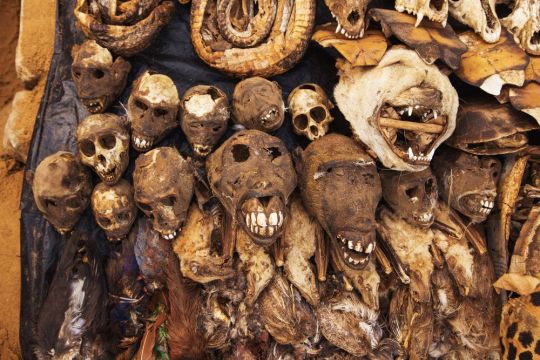
Juju is not just a objects but a practice that was and still is performed in West African countries. These objects or not good nor bad, but it can be used for both because they been infused with magical power.
The monkey’s head (above) are probably the most common juju seen in West Africa. In the south in New Orleans they're used quite often in voodoo as a object to protects a person or place from negativity and evil. (Important) There made from something which was once alive. Such as a tree that was used to make let's say mask, totem pole, doll, or a gator head, etc. Jujus can be hung above the door of a home or business, or placed on an altar or anywhere in the home that needs protection.
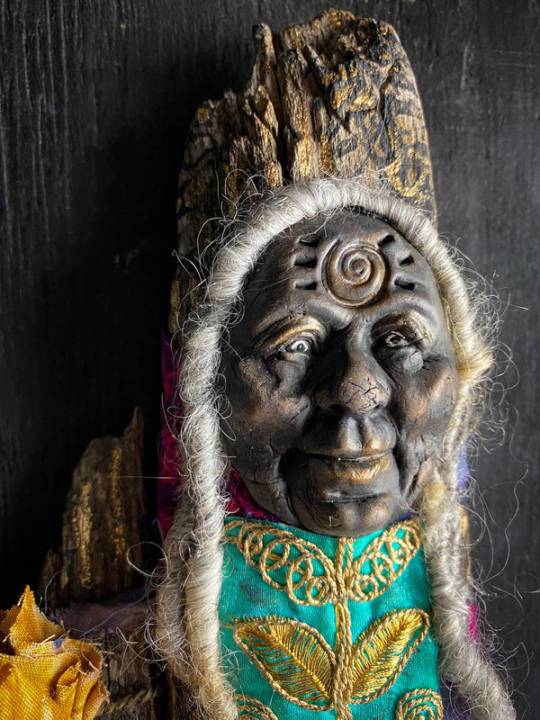

(Left) a juju doll not my photo. (Right are my alligator teeth juju
Juju operates by using physical contact. The belief is that two entities that have been in close contact have similar properties even after being separated. Which is why a person’s hair, fingernails, a piece of clothing, a shoe, a sock, or a piece of jewel all these things that were worn by a person are perfect candidates for a juju because it contains the essence of that's person's spirit.
Specialists with strong knowledge and experience would typically create a juju. The specialist may be anyone with spiritual knowledge and experience. Because juju's is commonly used as treatment for physical and spiritual ailments from healing insect and animal bites to stoping curses.
#Juju's#Juju charms#Charm#spiritual#like and/or reblog!#rootwork#conjuring#southern hoodoo#louisiana voodoo#West African charm#African juju#google search#follow my blog#Magical charms#Amulets
19 notes
·
View notes
Text

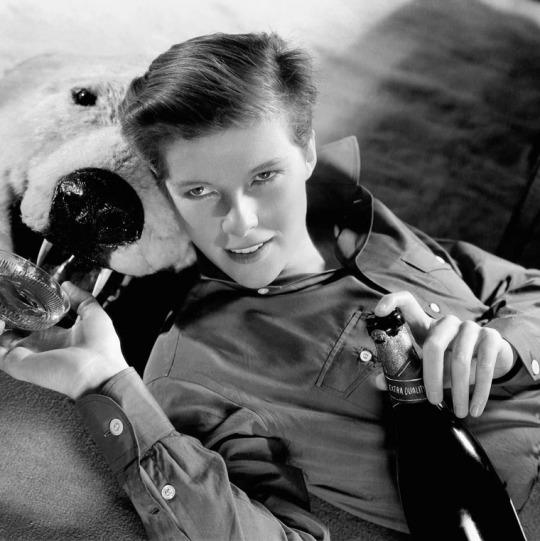
Propaganda
Natalie Wood (West Side Story, The Great Race)—She went through so much shit which I know can be said for all these women but Natalie really was a star and her death often overshadows her career and life. She could make you cry, but she also had the capacity to be incredibly funny which I think is lost on people.
Katharine Hepburn (Bringing Up Baby, The Philadelphia Story, The African Queen)—(I hope someone else submits real propaganda but just in case they don't:) Cries. Screams. Wails. The woman who singlehandedly made me realize I was bi. A real "do i want to look like her. be her. or be with her.' crisis, where the answer was all three. Holy shit please all three.
This is round 5 of the tournament. All other polls in this bracket can be found here. Please reblog with further support of your beloved hot sexy vintage woman.
[additional propaganda submitted under the cut.]
Natalie Wood:



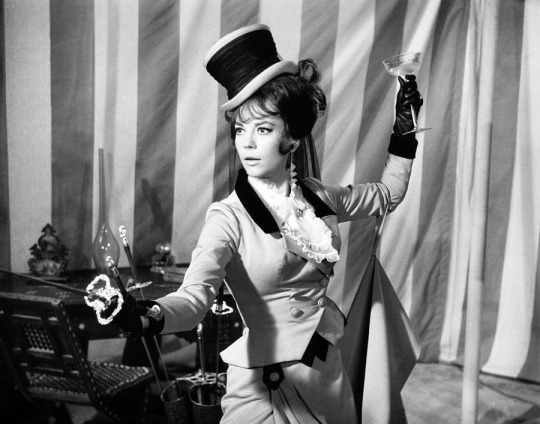
Katharine Hepburn propaganda:

I'm sure one million people will submit her as an iconic Hollywood star but that iconicness might lead people to forget just how insanely hot she was like she had it ALL she was skilled she was funny she was smart she was beautiful AND she was likely bisexual
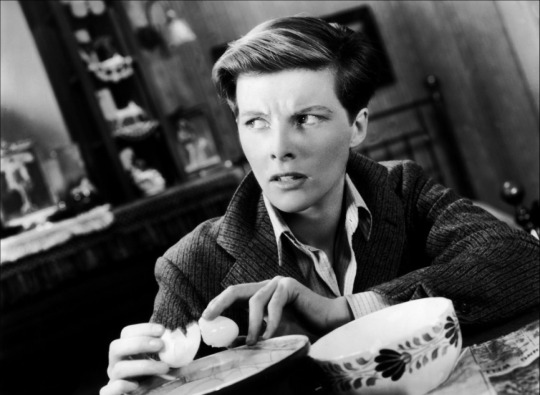
The single word I would use to explain Katherine Hepburn's appeal is *range*. In her acting career, that meant covering all the ground between lush period dramas and the comedies she did with Carey Grant and Spencer Tracey. In terms of hotness, it meant an uncanny ability to bring anything from a Dietrich-esque androgyny to some of the best Classic Hollywood Glamour you will ever see.
Katharine hep was so cool. The VIBES, the INDEPENDENCE,,, living life on her own terms.

she just had this.... bearing to her, this power. she could be funny, even silly (like in bringing up baby) but also so regal and elegant. she was nobody's fool and dear GOD that's so hot
Fancam link
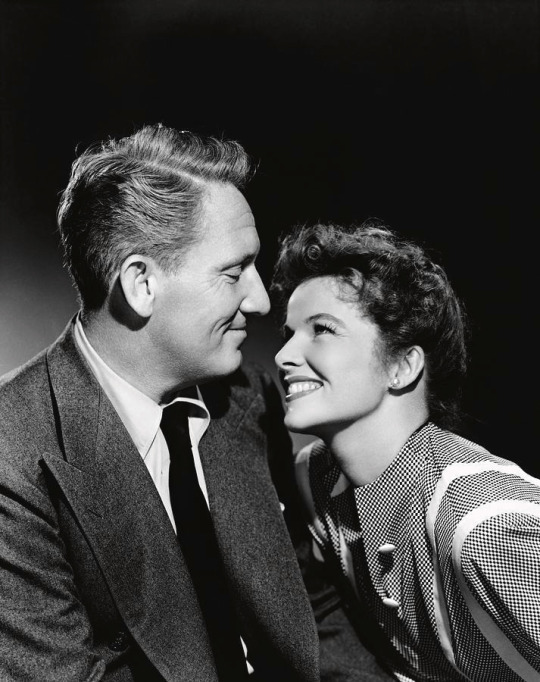
She’s not only stunningly gorgeous (those eyes that pierce your soul! a jawline you could cut glass with!) but her delivery and physical presence in roles gives off confidence and authority in such a sexy way (truly the biggest dick energy of Old Hollywood). Her fiery energy in The Philadelphia Story? Unmatched.
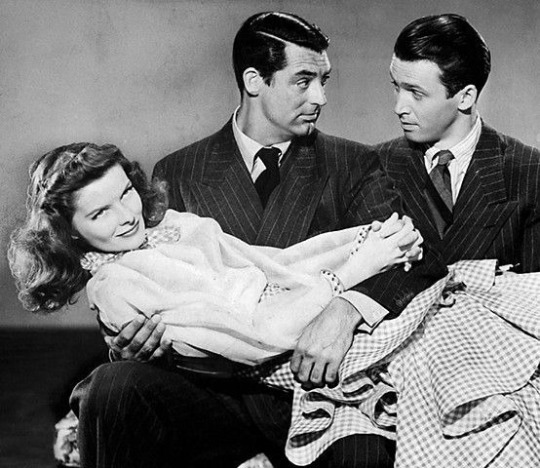
God she's. She's so hot y'all. She has the range!!!!! Funny and dramatic and lovely
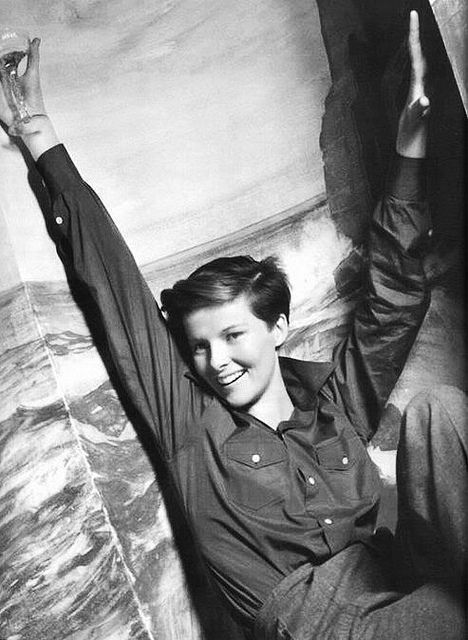
She IS the transatlantic accent. Classically gorgeous and such a strong personality.

She's literally one of the funniest women to ever live! She goes shot for shot with Cary Grant in Philadelphia Story and we damn well love her for it! She's the most annoying creature to ever live in Bringing Up Baby but she's so insane and funny that we simply cannot help but fall in love with her (and root for her to give Grant an aneurysm!)
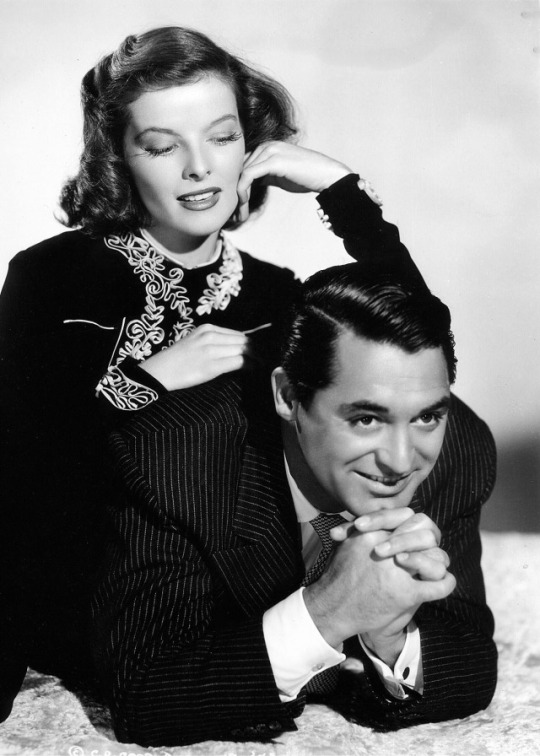
i know she's accounted for but i really want to be sure someone has submitted the scene in bringing up baby where she's pretending to be a gangster
youtube
She simply stuns onscreen; you cannot do anything but be captivated by her presence. Also a non-gender-conforming icon and mild tumblr celebrity by virtue of that one picture from The Warrior's Husband (stage play).
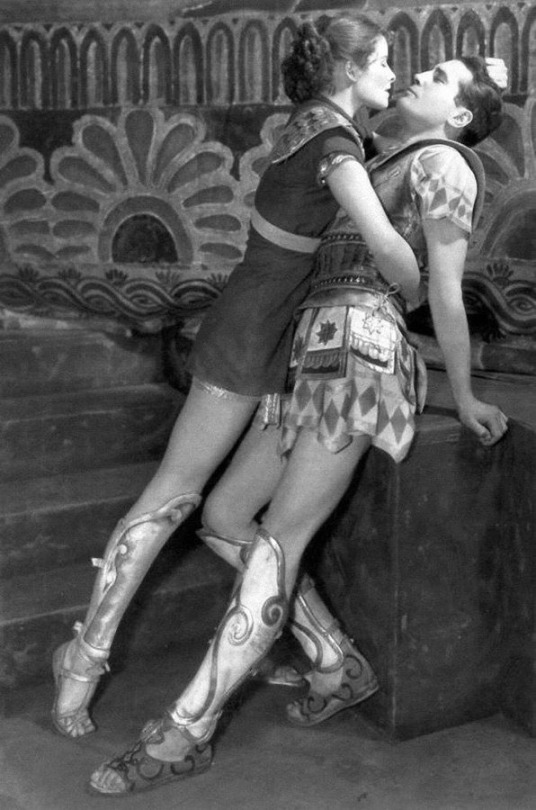
Katharine Hepburn was out here casually changing the lives of young butch lesbians with her gender swag! She wore pants even when people said she shouldn’t, she refused to marry or have kids, and she wore menswear in at LEAST one movie!
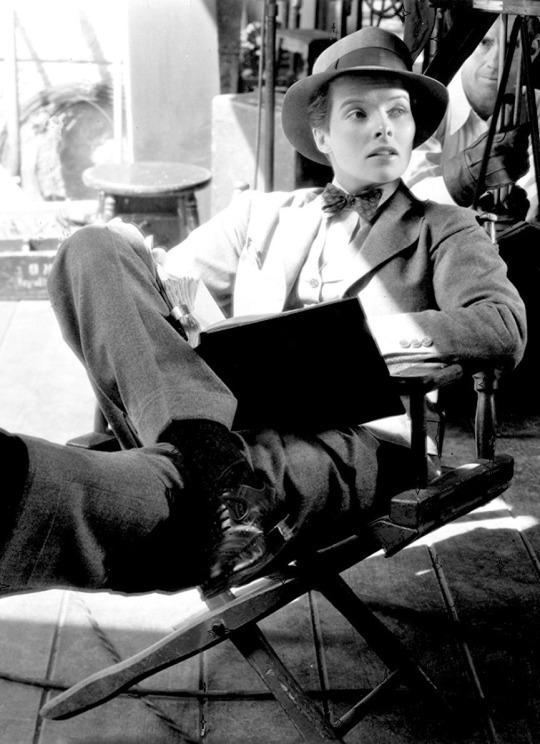
If I start thinking about her face for too long I will cry she is so so hot. Katherine is so charismatic and charming in everything she appears in - watch her adopt a leopard and fall in love with her. Also she has the biggest dick energy ever (she and her pal Lauren Bacall share that accolade). Also had an incredibly long and varied career from screw ball comedies to serious dramas - she’s a queen of the screen and I adore her.
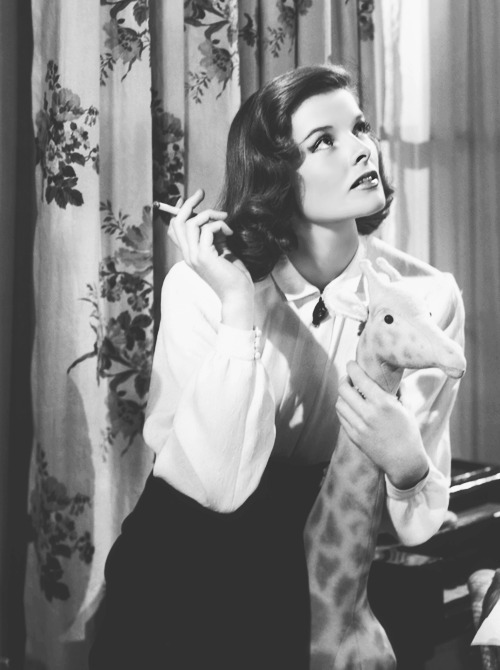
Someone's got to mention it, but she's won the most Oscars out of any performer and is largely considered one of the greatest actresses ever. She's got an incredible voice, an incredible presence, and she absolutely steals every scene she's in. She was private person and deemed standoffish and unapproachable, but she was also profoundly concerned for people's rights and was an outspoken supporter of abortion access. Finally, the Katharine Hepburn slacks look is just iconic. I mean look at her.

This woman. I have been obsessed with her for years. I know the urban legend is a popular one at this point of her walking around set in her underwear when her pants were stolen and she was left with only a skirt, but the pants thing is honestly enough for her to be the hottest in the room in my book. She refused to wear anything else at a time when the public in general and especially the studios did not like that. She was independent, stubborn, and so so very capable. Competency kink anyone? Also, if you want one final way that Katharine's entire life was saying "fuck you" to the establishment, it started young! Her mother took her to suffrage events, and she never got rid of that attitude of justice. I feel like I have barely scratched the surface of all the ways she was such a badass that I'm turning into a rambling mess instead.

350 notes
·
View notes
Text
Reading list for Afro-Herbalism:
A Healing Grove: African Tree Remedies and Rituals for the Body and Spirit by Stephanie Rose Bird
Affrilachia: Poems by Frank X Walker
African American Medicine in Washington, D.C.: Healing the Capital During the Civil War Era by Heather Butts
African American Midwifery in the South: Dialogues of Birth, Race, and Memory by Gertrude Jacinta Fraser
African American Slave Medicine: Herbal and Non-Herbal Treatments by Herbert Covey
African Ethnobotany in the Americas edited by Robert Voeks and John Rashford
Africanisms in the Gullah Dialect by Lorenzo Dow Turner
Africans and Native Americans: The Language of Race and the Evolution of Red-Black Peoples by Jack Forbes
African Medicine: A Complete Guide to Yoruba Healing Science and African Herbal Remedies by Dr. Tariq M. Sawandi, PhD
Afro-Vegan: Farm-Fresh, African, Caribbean, and Southern Flavors Remixed by Bryant Terry
Barracoon: The Story of the Last “Black Cargo” by Zora Neale Hurston
Big Mama’s Back in the Kitchen by Charlene Johnson
Big Mama’s Old Black Pot by Ethel Dixon
Black Belief: Folk Beliefs of Blacks in America and West Africa by Henry H. Mitchell
Black Diamonds, Vol. 1 No. 1 and Vol. 1 Nos. 2–3 edited by Edward J. Cabbell
Black Faces, White Spaces: Reimagining the Relationship of African Americans to the Great Outdoors by Carolyn Finney
Black Food Geographies: Race, Self-Reliance, and Food Access in Washington, D.C. by Ashanté M. Reese
Black Indian Slave Narratives edited by Patrick Minges
Black Magic: Religion and the African American Conjuring Tradition by Yvonne P. Chireau
Black Nature: Four Centuries of African American Nature Poetry edited by Camille T. Dungy
Blacks in Appalachia edited by William Turner and Edward J. Cabbell
Caribbean Vegan: Meat-Free, Egg-Free, Dairy-Free Authentic Island Cuisine for Every Occasion by Taymer Mason
Dreams of Africa in Alabama: The Slave Ship Clotilda and the Story of the Last Africans Brought to America by Sylviane Diouf
Faith, Health, and Healing in African American Life by Emilie Townes and Stephanie Y. Mitchem
Farming While Black: Soul Fire Farm’s Practical Guide to Liberation on the Land by Leah Penniman
Folk Wisdom and Mother Wit: John Lee – An African American Herbal Healer by John Lee and Arvilla Payne-Jackson
Four Seasons of Mojo: An Herbal Guide to Natural Living by Stephanie Rose Bird
Freedom Farmers: Agricultural Resistance and the Black Freedom Movement by Monica White
Fruits of the Harvest: Recipes to Celebrate Kwanzaa and Other Holidays by Eric Copage
George Washington Carver by Tonya Bolden
George Washington Carver: In His Own Words edited by Gary Kremer
God, Dr. Buzzard, and the Bolito Man: A Saltwater Geechee Talks About Life on Sapelo Island, Georgia by Cornelia Bailey
Gone Home: Race and Roots through Appalachia by Karida Brown
Ethno-Botany of the Black Americans by William Ed Grime
Gullah Cuisine: By Land and by Sea by Charlotte Jenkins and William Baldwin
Gullah Culture in America by Emory Shaw Campbell and Wilbur Cross
Gullah/Geechee: Africa’s Seeds in the Winds of the Diaspora-St. Helena’s Serenity by Queen Quet Marquetta Goodwine
High on the Hog: A Culinary Journey from Africa to America by Jessica Harris and Maya Angelou
Homecoming: The Story of African-American Farmers by Charlene Gilbert
Hoodoo Medicine: Gullah Herbal Remedies by Faith Mitchell
Jambalaya: The Natural Woman’s Book of Personal Charms and Practical Rituals by Luisah Teish
Just Medicine: A Cure for Racial Inequality in American Health Care by Dayna Bowen Matthew
Leaves of Green: A Handbook of Herbal Remedies by Maude E. Scott
Like a Weaving: References and Resources on Black Appalachians by Edward J. Cabbell
Listen to Me Good: The Story of an Alabama Midwife by Margaret Charles Smith and Linda Janet Holmes
Making Gullah: A History of Sapelo Islanders, Race, and the American Imagination by Melissa Cooper
Mandy’s Favorite Louisiana Recipes by Natalie V. Scott
Medical Apartheid: The Dark History of Medical Experimentation on Black Americans from Colonial Times to the Present by Harriet Washington
Mojo Workin’: The Old African American Hoodoo System by Katrina Hazzard-Donald
Motherwit: An Alabama Midwife’s Story by Onnie Lee Logan as told to Katherine Clark
My Bag Was Always Packed: The Life and Times of a Virginia Midwife by Claudine Curry Smith and Mildred Hopkins Baker Roberson
My Face Is Black Is True: Callie House and the Struggle for Ex-Slave Reparations by Mary Frances Berry
My Grandmother's Hands: Racialized Trauma and the Pathway to Mending Our Hearts and Bodies by Resmaa Menakem
On Her Own Ground: The Life and Times of Madam C.J. Walker by A'Lelia Bundles
Papa Jim’s Herbal Magic Workbook by Papa Jim
Places for the Spirit: Traditional African American Gardens by Vaughn Sills (Photographer), Hilton Als (Foreword), Lowry Pei (Introduction)
Post Traumatic Slave Syndrome by Dr. Joy DeGruy
Rooted in the Earth: Reclaiming the African American Environmental Heritage by Diane Glave
Rufus Estes’ Good Things to Eat: The First Cookbook by an African-American Chef by Rufus Estes
Secret Doctors: Ethnomedicine of African Americans by Wonda Fontenot
Sex, Sickness, and Slavery: Illness in the Antebellum South by Marli Weiner with Mayzie Hough
Slavery’s Exiles: The Story of the American Maroons by Sylviane Diouf
Soul Food: The Surprising Story of an American Cuisine, One Plate at a Time by Adrian Miller
Spirituality and the Black Helping Tradition in Social Work by Elmer P. Martin Jr. and Joanne Mitchell Martin
Sticks, Stones, Roots & Bones: Hoodoo, Mojo & Conjuring with Herbs by Stephanie Rose Bird
The African-American Heritage Cookbook: Traditional Recipes and Fond Remembrances from Alabama’s Renowned Tuskegee Institute by Carolyn Quick Tillery
The Black Family Reunion Cookbook (Recipes and Food Memories from the National Council of Negro Women) edited by Libby Clark
The Conjure Woman and Other Conjure Tales by Charles Chesnutt
The Home Place: Memoirs of a Colored Man’s Love Affair with Nature by J. Drew Lanham
The Jemima Code: Two Centuries of African American Cookbooks by Toni Tipton-Martin
The President’s Kitchen Cabinet: The Story of the African Americans Who Have Fed Our First Families, from the Washingtons to the Obamas by Adrian Miller
The Taste of Country Cooking: The 30th Anniversary Edition of a Great Classic Southern Cookbook by Edna Lewis
The Tuskegee Syphilis Study: An Insiders’ Account of the Shocking Medical Experiment Conducted by Government Doctors Against African American Men by Fred D. Gray
Trace: Memory, History, Race, and the American Landscape by Lauret E. Savoy
Vegan Soul Kitchen: Fresh, Healthy, and Creative African-American Cuisine by Bryant Terry
Vibration Cooking: Or, The Travel Notes of a Geechee Girl by Vertamae Smart-Grosvenor
Voodoo and Hoodoo: The Craft as Revealed by Traditional Practitioners by Jim Haskins
When Roots Die: Endangered Traditions on the Sea Islands by Patricia Jones-Jackson
Working Conjure: A Guide to Hoodoo Folk Magic by Hoodoo Sen Moise
Working the Roots: Over 400 Years of Traditional African American Healing by Michelle Lee
Wurkn Dem Rootz: Ancestral Hoodoo by Medicine Man
Zora Neale Hurston: Folklore, Memoirs, and Other Writings: Mules and Men, Tell My Horse, Dust Tracks on a Road, Selected Articles by Zora Neale Hurston
The Ways of Herbalism in the African World with Olatokunboh Obasi MSc, RH (webinar via The American Herbalists Guild)
1K notes
·
View notes
Text
four times we almost kissed and the one time we did (kol mikaelson x f!reader)

warnings: slight blood sharing, mostly frusteration
a/n: unfortunately for my sanity, i have fallen in love with kol. why? i couldn't tell you. the actor drives me up a fucking wall. but the character? i am down for bad. so here ya go. feel free to request more kol or over tvdu characters!!
↳ masterlist ↳ want to be shipped with a fic character?

[1] First meeting
Magic has existed in New Orleans for as long as anyone can remember. The prevalence of voodoo-- NOLA's most giant "tourist trap"-- originated in 1791 with enslaved West Africans who moved to Louisiana to grow a community for as many free people of color. That spirit meant that many of its inhabitants descended from that original society or were drawn here for its magical properties. Your family was one of the latter, a bunch of witches seeking solace in a place that nurtured it. Except with magic came strife, and eventually, other creatures came knocking at the door. Enter the Mikaelsons, New Orlean's resident vampire family that was always at the center of whatever drama was happening. Right now, something involving all those magically oriented.
You made it a point to stay clear of the fight. Not because you didn't care– you did– but because it wasn't your fight to be had. That's how you stayed alive in this neighborhood; you knew where to stick your nose and when to stay clear. Besides, all the commotion with one of the Harvest girls (Cassie, you believe her name was) and the witch's distaste of vampires meant tensions were high. You could help the community from the background anyway; you didn't need to make yourself known.
At least, that's what you hoped. But things rarely turned out how you wanted, and this was one of those times. Walking through the back streets of NOLA was never an excellent idea, but it was shorter, and you just wanted to get to the metaphysical supply store before it closed. You needed more laurel leaves to create protection charms around your house, especially with the uptake in strife in the recent year.
Which is how you came upon a witch killing three vampires in the alley.
You wanted to turn on your heel and leave, but the witch noticed you before you could. You didn't recognize him, so you were unsure what coven he belonged to. He was tall enough to probably tower over you, with golden curly hair and a jaw sharp enough to cut your fingers if you touched it. He was unbelievably handsome, and you hated that it caught your breath.
"You shouldn't be here, luv," he crooned, his English accent thick. He sauntered down the alley, coming up to you with narrowed eyes.
"I don't recognize you," you countered, shifting your weight as you crossed your arms. It's best not to let him know that you're flustered.
"New in town," he smiled, a cocky grin that told you that he absolutely knew the effect he had on women. It left a bad taste in your mouth. "New Orleans is a big city; I'm surprised you would know everyone."
"I know witches," you said, peering up at him.
"Ah, are you a magical thing yourself?"
"What do you think?" You arched a brow. He stepped closer, reaching up to twirl a piece of your hair around his finger. You recoiled slightly but didn't pull back. Never show fear; that's one thing this town taught you.
"I think you're a pretty young thing," he hummed. "I'm Kol." He peered at you as if waiting for you to offer your name. You didn't.
"Not interested," you pulled back from him, letting the hair he had touched fall back in front of your face. He stepped back into your space.
"I don't know, darling," he smiled, leaning closer so his breath fanned your face. It was minty like he had just had an Altoid. "I think you're interested." You hated admitting that this tall, handsome stranger (such a cliche) was right. And you really hated that if you leaned up slightly, you could feel the warmth from his lips. He stepped back, though, hands in his pockets. The same hands that had used magic to wrangle the undead life of the vampires behind him. You took that as a sign to start to leave, walking backward before turning on your heel and ignoring the gaze of the witch behind you.
"Never got your name!" He chimed. You smiled to yourself.
"Figure it out yourself."
[2] Cemetery watch
Disgruntled. That's how you felt. Chaos had grown over the past weeks, but you didn't see Kol again. A sliver of disappointment, as you did find him cute, but also a relief. You know enough flirtatious bastards to not want to add more to your life.
You weren't thinking about him today, though. You were thinking about your grandmother, who lived in the cemetery right outside your block. A popular cemetery for Wiccan rituals, it made sense for your grandma (the high priestess of your family) to be buried there with heavy praise.
You were laying a combination of roses, lavender, and rosemary for protection when the hair on your neck stood up. Feeling a presence, you soon turn around, making eye contact with the stranger who approached you.
Definitely not a witch; his aura was too dark for that. He was tall, with tousled brown hair and eyes that lingered on you for far too long. He was cute, though, even if he was dangerous.
"Hello darling," he purrs, stalking closer.
"Can I help you?" You sigh, crossing your arms as you peer at him with suspicion. He wears a cocky smile and a look that tells you he would love to have a taste.
"Don't remember me? I'm hurt," he puts a hand on his chest, feigning pain. You look at him closely, but the only recognition is in the pet name. Darling. Not many people called you darling.
"Kol," you said. "You're shorter." His face had a hint of shock before settling into amusement.
"That was uncalled for," he laughed, walking closer to you. In closer proximity, you could see that he was, in fact, very handsome, and he was definitely aware of that.
"I'm reiterating my previous question, can I help you?"
"When my family sent me on this mission to track down the 'wisest witch in the quarter,' I was not expecting you," he looked down at you with gold-flecked eyes. "The beautiful girl who wouldn't give me her name. Except now I know it's Y/N."
"I thought you were a witch," you took a hesitant step back, trying to create space.
"Temporarily," he sighed. "Now I'm back in my original form of vampire." The way he said it gave you pause, as if he was resigned to the fact but not happy about it. You could relate. If you lost your magic, you would be devastated.
"You said something about your family?" you coughed, changing the subject.
"There's someone working against them, and we would prefer if they don't kill us," Kol shoved his hands in his pockets, looking up at the clouds above. "People tend to hate us, Mikaelsons."
"You're a Mikaelson?" you hissed. It was because of the Mikaelsons your home was in constant disaster. "Why should I help you? Any of you?"
"For the most part, we don't want to cause trouble. It just tends to find us. Helping eliminate a threat means fewer problems in the quarter," Kol sighed, stepping closer. His fingers brushed your cheek, delicate as if touching the grass in a meadow. "Also, you'd get to spend time with me."
"Why would I want to spend time with you?" you breathed, voice wavering slightly. Curse your damn hormones for being swayed by a vampire of all creatures. His thumb came under your chin, allowing him to bring your face closer to his. Kol smelled like fresh snow and evergreens, and you knew that if he leaned a little bit closer, you wouldn't stop him. In the process, likely offend the ghost of your grandmother who was probably rolling her eyes at you right now. Before you could offend all the ancestors with your choices, Kol stepped back, resuming his cocky grin and leaving your breath lodged in your throat. Without a second thought of the implications, you made your decision.
"Fine, I'll help you."
[3] Late night spell-casting
Late nights in the Mikaelson compound meant one thing. Coffee, and lots of it.
You made a deal with the Mikaelsons after you agreed to help them that in exchange for your time, they had to buy you cafe drinks whenever you liked it. Elijah was the most taken aback, but Kol chuckled as if he found you amusing. Still, they found it a small price, not expecting how much you valued your drinks. Most nights, it was coffee, sometimes tea, or even hot cocoa. Quite honestly, you just liked having the power to make them run around.
You sat at one of their many couches, a book of shadows in your lap and a notepad in your hands as you made quick notes about possible spells that could combat the evil at hand. A couple of ideas swam in your head, but you wanted to exhaust your options before risking anyone else's life with a botched spell. Still, you had been at it for hours and started getting sleepy. You yawned, feeling your eyes close slightly. Thankfully, footsteps alerting you to the presence of one of the originals had you sitting up and shaking off your fatigue. Unfortunately, that original was Kol with your coffee order.
Kol was precisely what you thought he would be. Flirtatious, cocky, impulsive, and too attractive for his own good. You hated when murderers were cute; it made life confusing. There were moments, though, when the two of you were performing recon or pouring over spell books that you saw a side of him that only showed when his guard wasn't up. He was calmer, more academic, and a lot more unsure of himself. The only thing you hated about seeing that side is it made you like him more.
"How's my witchling doing?" he chimed, dropping off your coffee and settling beside you on the couch. You told him that being called darling felt ridiculous, so instead, he found a new nickname, which was even worse.
"The usual, I suppose," you yawned again, leaning your head against the back of the couch.
"Take a break."
"You realize it's your life on the line, right?" you huffed, turning to look at him.
"My life will always be in danger, Y/N," Kol hummed, taking your books out of your lap with a minor protest from you. "That's not going to change tonight."
"Don't underestimate me," you grabbed your cup, taking a deep sip and looking at him over the lid.
"I would never underestimate you," he grabbed your coffee and stole a sip himself, earning a growl from you. "Half the things you say shock and confuse me."
"It's my charm."
"Let's do something fun," Kol stood up, trying to drag you with him. "Research is bloody boring."
"We have two very different ideas of 'fun,' Mikaelson," you curled up into a ball on the couch, peering up at him through heavy-lidded eyes. An idea sparked in your head, and you turned a devilish smile to the brunette. "How about tarot cards?"
You found an old deck in the compound, creating a space on the table in the central area to lay out the spread. Even though having your cards would be better, you thought you could probably make do with these. You gave Kol the cards to shuffle and watched as he spent meticulous time connecting with the cards before handing the deck back to you. You started laying out the cards on the table, forming a cross with four cards separate on the side. You tucked your legs underneath you, curling up on the floor so you were huddled by the table. Kol joined you, his back against the couch as he peered at you straightening up the cards.
"You realize you're going to flip them over, right?"
"Shut up, Mikaelson," you chimed, finishing your organization. He watched you with a small smile, and you made the effort to ignore his stare. "We'll start with your Present card."
“Boring,” Kol sing-songed. "Tell me my future."
"I have to go in order, to give an accurate reading."
"Darling, the cards are already laid out; you can do whatever you want," Kol leaned closer to you, squinting his eyes in amusement. "I live my life in futures; who cares about the past?"
Sighing, you decided to obey the nosey vampire and flip over his cards for Future and Near Future. The two cards revealed were the Lovers and Ace of Cups, respectively.
"In your Future is a strong romantic relationship," you start, pointing out the Lovers card featuring two swans intertwined. "This correlates to the Ace of Cups, which signifies new beginnings. Since the Ace of Cups is in your near future, you'll likely encounter someone you'll soon develop a deep, long-lasting relationship with." You turn your eyes to Kol, raising an eyebrow. "Shocking, considering your personality."
"It's not that shocking," Kol quipped, leaning closer to you. "We're here, aren't we?"
His pupils were enlarged as he gazed upon you, and his glance to your lips told you exactly where his mind was. You couldn't deny you weren't thinking the same thing. It didn't help that Kol was dangerous in an enticing way. Ignoring all rational thought, you leaned in closer, nudging his nose with yours. Your heart was beating erratically, and you heard the sharp intake of breath he took. His fingers traced up your arm, each finger leaving goosebumps in their wake. What were you doing?
"How's the research going?" a voice called from the hallway. You scooted away immediately, but Kol stayed where he was. His jaw clenched as he suppressed a growl. Freya appeared, not aware of the situation and probably not caring anyway.
"I have a few ideas," you coughed, taking a deep breath to calm your beating heart.
"Great, I'd love to hear them so I can stop having stressful dreams," Freya chuckled, moving over to the couch. You sent Kol a glance as you passed your journal to Freya. The look he gave you told you that what started wasn't over. And the worst part was you didn't want it to be over.
[4] Injured after a fight
A headache. That's what you were nursing.
A sharp ringing pierced through your ears, the lights above you blurring into a bad abstract painting. A figure appeared above you, and you slowly registered that it was calling your name. You squinted your eyes, the action causing a splitting pain as the shape of Kol formed in front of you. Worry creased his brows, and blood splattered his face.
"Y/N, Y/N, can you hear me?" Kol asked, cradling your head. You nodded, grabbing his arms to help pull yourself up. Chaos was erupting around you, and the stifling smell of magic was enough to knock you out again. That's what had happened. It was an ambush, and despite your abilities, you were blasted back into a wall, probably with a concussion and broken bones. It was times like this when you were envious of a vampire's healing skills. "I need to get you out of here."
"They need our help," you grimaced, catching Klaus ripping off someone's arms in the background. Kol caught your gaze and bothered with a slight smirk.
"I'm sure Nik is fully capable of handling himself. Plus, my other siblings are here, and Freya called Vincent. They won't miss us."
"I'll be fine," you tried to say, but it ended in a wheeze as the effort of sitting up caused pain in your lungs.
"You will not. Can you stand?" Kol watched you struggle for a second before picking you up. In a normal situation, you would've complained, but considering all you felt was ow ow ow ow ow you thought better than to complain. You wrapped your arms around his neck, holding on tightly as he sped out of the scene and back to the compound. Kol laid you gently on the couch, kneeling before you, biting into his wrist and holding it to your lips. "You need to drink."
"I don't want to be a vampire," you mumbled, brushing a hand across your forehead. Your fingers held blood on them, and you became dizzy with that knowledge.
"I won't let that happen now, drink," Kol insisted, his voice having a hard edge. Considering he was a stubborn bastard, you relented. You hesitantly grabbed his wrist and brought it up to your mouth. The blood slid down your throat cleanly, but you had to suppress the urge to gag anyway since it was blood. You felt your bones click into place, and your headache dull to a memory. You finally looked up, catching Kol's gaze on you. How was it intensely erotic to have someone watch you drink their blood? There must be therapy for issues like this, but you didn't really care. How he looked at you was akin to a predator waiting to devour its next meal. You knew if you let him, he would fulfill every potential vampire fantasy one could have. He touched your cheek, touching your lips where his blood was just a second ago. He pulled away, red coating his fingers, and you suppressed a groan when he sucked the leftover blood.
"Kol," you whispered, your voice raspy. He sat up at eye level, leaning down as if to kiss you. Of course, things weren't that easy, as his family burst into the compound right at that moment. You wanted to let out a scream of frustration but ended up being caught off guard by Klaus dropping a head by the entryway.
"Glad to see our little witch is okay," Klaus chimed, looking pretty proud of himself. If Kol were a cartoon character, he'd blow smoke out of his ears.
"I'm alive," you sighed. Klaus walked over, ignoring his brother's glares, and patted you on the shoulder. That was the closest thing to the affection you were getting from the hybrid. As the rest of the family delved into a conversation about the ambush, you finally got up and looked at the original kneeling on the ground before you. "We'll finish this later," you smiled, pretending to ignore the slight growl that left Kol's mouth as you walked off.
[5] Evil has passed
"I thought you would've left."
Kol stood in the entryway of his bedroom at the Mikaelson home while you stood (guilty) by his bookshelf.
"I was returning this book I borrowed from you," you said innocently. Putting the book back on the shelf, you turned to the man before you, trying his best to plaster on a convincing smile. The threat has passed, your job was over, and yet you were melancholy. These people had caused problems throughout your home since they arrived, yet your temporary alliance ending was something of sadness. You were tired of pretending it was for any reason other than Kol. Kol started as an annoying individual who sought to drive you up the wall, but now was someone you saw a kinship with. Your long talks on history and adventures across the globe were moments where you saw his guard fall, and you loved every second of it. It helped that he was pretty to look at.
"I guess this means goodbye then, doesn't it witchling?" Kol sighed, shoving his hands in his jeans pockets. You could swear he sounded disappointed, but you didn't want to get your hopes up.
"Depends," you crossed your arms. "I could be persuaded to come back."
"Persuaded?" Kol inquired, that mischievous glint in his eyes telling you he would ensure a way to keep you around. "Any particular reason?"
"If someone wanted me around, I guess," you smiled, a tiny grin but good enough for Kol to stroll towards you until he towered over your figure.
"I'll give you a good reason," Kol murmured, a devilish smirk on his lips. "Something that we kept getting interrupted for in the past." He cupped your face in his hands, lowering his lips so they were a hairsbreadth from yours.
"Don't be a tease," you breathed. Letting out a dark chuckle, he pressed his lips to yours. It was surprisingly light, not hungry like his usual personality. He tasted like a fresh snowstorm and an evergreen forest, and you know you could get drunk on that alone. Wrapping your arms around his torso, you brought him closer to you, deepening the kiss and earning a light groan from the vampire. Kol's hands tangled in your hair, one of them going to hold your waist. Every touch of his was coldfire, and you were so glad that you were finally alone to burn in him. He tilted your head back, leaving open-mouthed kisses along your throat that caused you let out a moan. He nipped the junction of your neck and shoulder, kissing over it until he was back at your lips again, leaving a searing kiss. Kol pulled away, glancing at you with eyes abysmal. "What took you so long to do that?" you breathed, a grin covering your face as Kol laughed, kissing the corner of your mouth.
"You're all mine now," Kol smiled, kissing you again. "Always and forever."
#kol mikaelson#kol mikaelson x reader#kol mikaelson imagine#klaus mikaelson#freya mikaelson#the originals#vampire diaries#tvd#tvdu#tvdu imagines#mikaelson#mikaelson family#my writing
347 notes
·
View notes
Photo

A manbo (also written as mambo) is a priestess (as opposed to a oungan, a male priest) in the Haitian Vodou religion. Haitian Vodou's conceptions of priesthood stem from the religious traditions of enslaved people from Dahomey, in what is today Benin. For instance, the term manbo derives from the Fon word nanbo ("mother of magic"). Like their West African counterparts, Haitian manbos are female leaders in Vodou temples who perform healing work and guide others during complex rituals.
This form of female leadership is prevalent in urban centers such as Port-au-Prince (the capital of Haiti). Typically, there is no hierarchy among manbos and oungans. These priestesses and priests serve as the heads of autonomous religious groups and exert their authority over the devotees or spiritual servants in their hounfo (temples).
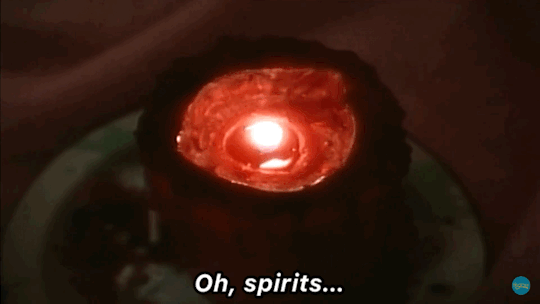
Manbos and oungans are called into power via spirit possession or the revelations in a dream. They become qualified after completing several initiation rituals and technical training exercises where they learn the Vodou spirits by their names, attributes, and symbols.
The first step in initiation is lave tèt (head washing), which is aimed at the spirits housed in an individual's head. The second step is known as kouche (to lie down), which is when the initiate enters a period of seclusion. Typically, the final step is the possession of the ason (sacred rattle), which enables the manbos or oungans to begin their work. One of the main goals of Vodou initiation ceremonies is to strengthen the manbo's konesans (knowledge), which determines priestly power.
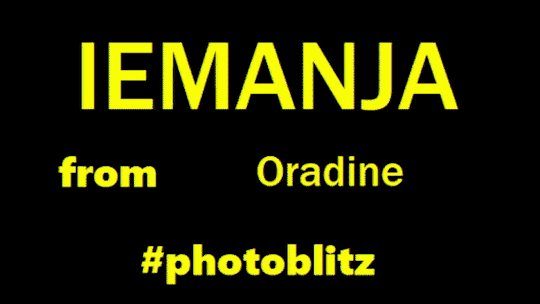
The specific skills and knowledge gained by manbos enable them to mediate between the physical and spiritual realms. They use this information to call upon the spirits through song, dance, prayer, offerings, and/or the drawing of vèvès (spiritual symbols). During these rituals, manbos may either be possessed by a loa (also spelled lwa, Vodou spirits) themselves, or may oversee the possession of other devotees. Spirit possession plays an important role in Vodou because it establishes a connection between human beings and the Vodou deities or spirits. Although loas can "mount" whomever they choose, those outside the Vodou priesthood do not have the skills to communicate directly with the spirits or gods. This is because the human body is merely flesh, which the spirits can borrow to reveal themselves via possession. manbos, however, can speak to and hear from the Vodou spirits. As a result, they can interpret the advice or warnings sent by a spirit to specific individuals or communities.
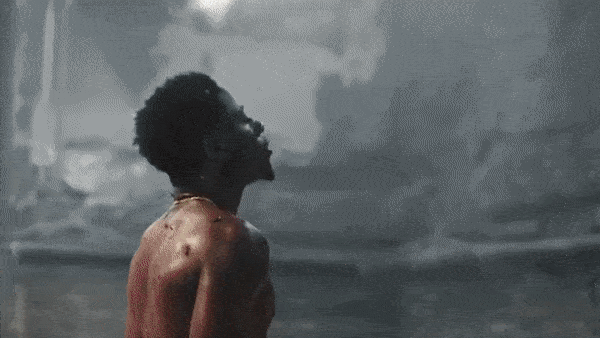
Cécile Fatiman is a Haitian manbo famously known for sacrificing a black pig in the August 1791 Vodou ceremony at Bois Caïman—an act that is said to have ignited the Haitian Revolution. There are also notable manbos within the United States. Marie Laveau (1801-1888), for example, gained fame in New Orleans, Louisiana, for her personal charm and Louisiana Voodoo practices.
Renowned as Louisiana's "voodoo queen", Laveau's legacy is kept alive in American popular culture (e.g., the television series America Horror Story: Coven).ne Mama Lola is another prominent manbo and Vodou spiritual leader in the United States. She rose to fame after the publication of Karen McCarthy Brown's ethnographic account Mama Lola: A Vodou Priestess in Brooklyn. Mama Lola's success provided her with a platform to challenge Western misconceptions of Haitian Vodou and make television appearances

#kemetic dreams#vodun#cecile fatiman#manbo#bois caiman#manbos#haitian#marie laveau#new orleans#new orleans voodoo#mama lola#vodou#lwa#oungan#nando#fan#west african#west african vodun#mother of magic#joey bada$$#brooklyn
258 notes
·
View notes
Text
Firewatch (March 2024 edition, Part 2)
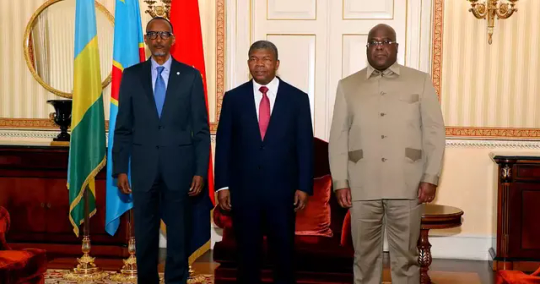
(This is Part 2 of my innagural edition of "Firewatch" becuase I was dumb and didn't realize what the character limit is. Read Part 1 here).
Full piece beneath the cut.
Smoldering Embers
These are the conflicts that, while not yet to the point where the flames are rising and heating up, smoke is starting to billow (or has been billowing) and there's potential for a real blaze to suddenly flare up at a moment's notice. You may have heard about them in the news here and there, but they're likely only popping up for your attention once in a blue moon because they haven't gotten bad or dramatic enough yet to fully grab the world's attention amid everything else going on.
West Africa/Sahel
The Sahel regions of West Africa are no stranger to crisis and conflict. Multiple countries in the region have already been dealing with internal political discord and armed conflict for years, but now multiple factors and various players seem to be converging in this part of Africa, positioning it to take a number of different paths forward in the coming months and years – few of which look very good.
West Africa and the Sahel are feeling a series of different pressures converging all at once. Since 2020, the region has seen a historic number of coup d'etats – both failed attempts and successful ones – which often come with a large amount of public support amid frustration with institutions and leaders that appear to be failing them. One reason for this frustration (among others that should be unsurprising, like economic troubles) is increasing amounts of instability throughout the region. Affiliates of both Al-Qaeda and the Islamic State both have footholds in the region, and are engaged in insurgencies against the governments of Mali (its most recent coup being in 2021, and also fighting a simultaneous insurgency by Tuareg separatists), Burkina Faso (most recent coup in 2022), and Niger (most recent coup in 2023), with Nigeria also dealing with a well over-decade old insurgency against Bokho Haram.
Niger's coup last year, in particular, seems to have been a watershed moment for the region and beyond. The country was strategically important both for its mineral resources (which unsurprisingly have not translated into economic and social development for the people of Niger themselves) and as a geographically well positioned outpost both for France (who's colonial legacy hangs heavily over the region) and the Untied States and other foreign powers, who all had troops stationed in the country to conduct counter-terrorism operations. The coup was seen as serious enough that the Economic Community of West African States (ECOWAS) issued an ultimatum to the Nigerien junta this past summer, threatening that if it did not cede power back to the elected President that ECOWAS would intervene to restore the legitimately elected government (as it has in the past).
Ultimately, the ECOWAS threats have not come to fruition and don't seem likely to – despite some apparent moves to do so in the aftermath of the coup. But out of those threats, Niger has joined into a new political and military alliance called the Alliance of Sahel States with both Burkina Faso and Mali (all of which had been suspended from ECOWAS due to their respective coups) to provide for collective self-defense against foreign intervention. Since 2023, French troops have been forced out of both Burkina Faso and Niger – with Niger now seemingly on the verge of doing the same to the remaining US troops in the country, while Vladimir Putin's Russia has seemingly been on a charm offensive to befriend the members of new alliance signing economic and military agreements and even reportedly dispatching troops – with mercenaries such as those from Wagner already having been active in the area (now operating under the new name of the "Africa Corps").
All these factors and more combined suggest that things in the Sahel are liable to get very interesting in the near future. As stated before, a number of different paths seem to unfold ahead for the region: if the ongoing radical insurgencies continue and are victorious, we could see a new territorial caliphate in West Africa and the Sahel mirroring that of IS in Iraq and Syria in the 2010s (and all the horrors that came with it). Barring that, as Russia deepens its ties to the AES, it could further turn the region into even more of a battleground in the multilateral Cold War we find ourselves in (as Russia is not the only authoritarian power seeking to deepen its influence in West Africa, as Turkey under Recep Tayyip Erdogan is also attempting to get involved there). Those are only two potential options out of many, and the myriad of other options in a region that is heavily populated and on the radar of multiple great powers means that it bears continued monitoring going forward.
The Democratic Republic of the Congo/Rwanda
Now this is one that I imagine is probably flying under the radars of most people who aren't deeper into my field, but is probably one of the most immediately pressing in Africa. The Democratic Republic of the Congo has been fighting against a rebellion by the armed group known as "M23" in its East for a decade now – that much isn't new. But now the conflict is threatening to turn onto a state-on-state war in Africa's Great Lakes region, as M23's primary back of neighboring Rwanda seemingly steps up its direct involvement into the conflict.
Rwanda has been backing M23 for some time now, with both Rwanda's government (under long-time President Paul Kagame) and M23 itself being primarily led by members of the Tutsi ethnic group. Rwanda also has a history of armed interventions in the DRC as well, so that in itself is not new. But in recent months the long-running tensions and low-level conflict between the DRC and Rwanda has threatened to boil over into outright, full-scale war, amid a series of fresh escalations – one prominent example being Rwanda firing on a DRC fighter-jet that it claimed violated its airspace. The high level of tensions has been further evidenced by more direct US involvement recently than is typically seen in this part of the world, with the United States and other governments attempting to broker some kind of peaceful resolution between the DRC and Rwanda. These efforts do not seem to have made much headway, with this past month the United States resorting to publicly urging both the DRC and Rwanda to "walk back from the brink of war." US mediation efforts may well be undermined, however, by it's (and many other Western countries') cozy relationship with Rwanda – despite its autocratic leader.
The trajectory for the current crisis remains unclear. A sideline meeting during the African Union summit in the Ethiopian capital of Addis Ababa appeared to make some progress in at least getting both the DRC and Rwanda to sit at one table and discuss a return to a peaceful dialogue to resolve their differences. However, that same day, the DRC accused Rwanda of having launched a drone attack in the city of Goma – a key objective of M23's advances, seemingly pouring cold war on the idea of constructive and peaceful reconciliation for the time being. Most recently, the DRC appears to be acquiring drones of its own, with China reportedly set to supply the DRC with nine CH-4 armed drones (apropos of nothing, China has also supplied a fair amount of military hardware to Rwanda in recent years, as well as military training).
With little other news available on the crisis since February (with other global events taking precedence), it remains unclear where things with the DRC and Rwanda go from here. There have been reports that the DRC and Rwandan leaders may be preparing to meet face-to-face once more, through mediation by Angola. At the same time, little seems to have changed with the personalities at play. DRC President Felix Tshisekedi was recently re-elected (under conditions labeled a "farce" by the DRC opposition), and has previously taken a hard line on the crisis, threatening to "march on Kigali" if re-elected and the issues with Rwanda persist. The DRC's acquisition of drones from China seems to reinforce that it has no plans of backing down in its confrontation with M23 and Rwanda, even if Tshisekedi doesn't follow through on his more bellicose threats. Meanwhile in Rwanda, Kagame announced his intent to seek a fourth term as President – amid criticism for lifting term limits in order to stay in office longer (criticisms that he has made clear he cares very little for if at all), and so has an impetus to maintain his own hard-line on issues with the DRC.
A further ticking clock has been added to the DRC-Rwanda situation by the fact that the United Nations mission in the Congo – which has been assisting the DRC fight against rebels (including M23) for almost two decades – will now be leaving the DRC by the end of 2024 at the request of the DRC government, stating that the force had not been able to resolve the war with M23. This comes after the DRC government also ordered troops from the East African Community (EAC) that had been present in the country as well to leave in late 2023 – for the same reasons it ordered the UN force to leave. While the DRC may well be right that neither force has helped it to beat M23, the withdrawal of these troops may very well shift the entire balance of the conflict and not necessarily in a way that the DRC wants. The South African Development Community (SADC), led by South Africa itself, is seeking to fill the gap left by the UN and EAC, but it remains to be seen how quickly they can do so and if they can change facts on the ground any more than the UN or EAC could. Once again, we see a number of potential factors on a collision course, and while cooler heads may still prevail, we see the prospect of yet another major war in the heart of Africa's Great Lakes regions that could have significant impacts for the people of the region, the continent, and the world. It is definitely worth keeping an eye on this developing situation (to the extent you can even find news on it).
Ethiopia
Ethiopia, like Myanmar, is a country that has shown up in the past when I've done a round-up on pertinent conflicts in the world. However, unlike with Myanmar, I'm afraid I can't report that things are getting better in Ethiopia's case or that there's much cause for hope at this point. In fact, things seem to be getting actively worse.
The last time I substantively talked about Ethiopia, the government of Prime Minister Abiy Ahmed was engaged in a war in the Tigray region against the Tigray People's Liberation Force – even allying with his former long-time adversary of Eritrea to do so in a war that threatened to rip the country apart while engaging in brutal authoritarian actions that I'm sure are making the Nobel Committee really regret giving him that prize in retrospect. After a seesawing of the fortunes of war back and forth for both sides, the conflict was seemingly brought to a close by the signing of a peace agreement between the TPLF and the Ethiopian federal government. All's well that ends well, done and dusted, right?
Well, actually: no.
Just less than a year after the Tigray War ended, Abiy apparently tripped over his dick into a new internal conflict in mid 2023, this time with Amhara people and forces in the eponymous Amhara region (Ethiopia's second most populous) rather than Tigray. The spark for this conflict was apparently born out of the haphazard way in which Abiy ended the previous one. One of Abiy's key allies in the Tigray War were militias and security forces from the region of Amhara, including an influential armed group known as the "Fano." However, the peace deal that Abiy struck with Tigray did not sit well with many Amahara people, who felt betrayed by the deal due to Tigray claims on their territory (as well as the fact that the Ethiopian federal military and security forces had been unable to prevent the TPLF from occupying Amahara territory during the war). This rift was only made worse by crackdowns by Abiy's government against the Fano, coupled with a plan to absorb Ethiopia's regional security forces into Ethiopia's federal military and security forces, which was not received well among the Amhara. These tensions and more came to a head from April through August 2023, with the result being Abiy's government facing down a fresh and ongoing revolt that doesn't appear to be ending soon.
The result of this bridge burning by Abiy has been a growing war in Amhara occurring under the umbrella of an ever prolonged state of emergency in Amhara that gives Ethiopian authorities broad powers to carry out arrests, impose curfews, and ban public gatherings. This is a continuation of the Abiy's playbook of gross human rights violations from the previous war in Tigray, with accusations being leveled against his government of arbitrary arrests, extrajudicial executions, and indiscriminate killings – including indiscriminate drone strikes against targets such as schools and public transit stations (apropos of nothing, once more, Abiy has acquired his fleet of armed drones from Iran, Turkey, and China – as well as purchasing new fighter jets from Russia). If you're wondering why you haven't heard more about all this, its because Abiy has made heavy handed use of another favorite tactic of his from the previous war (and that it has even used against Amhara in the past), which is information and specifically internet blackouts, which make it very difficult to get information out of Amahara as the conflict drags on (as it did in Tigray during that war).
Abiy's uncanny knack for burning bridges and making enemies isn't limited to within his own country, but has made tensions rise throughout East Africa. At the start of 2024, Abiy signed an agreement with the breakaway region of Somaliland in Somalia, which reportedly gives Ethiopia a naval port on Somaliland's coastline in exchange for recognizing the region's independence from Somalia (something that no other UN member state does). All of this appears to be part of Abiy's quest to regain Ethiopian access to the sea (lost after Eritrea became independent), which has included efforts to re-establish the Ethiopian Navy. The reaction to this deal has been, unsurprisingly, poorly received in Somalia, with Somali President Hassan Sheikh Mohamud even threatening the possibility of war if Ethiopia follows through with it and accusing Ethiopia of outright trying to annex part of Somalia. Somalis are not the only ones unease about Ethiopia's quest for access to the Red Sea, with other East African states such as Djibouti, Eritrea, and Kenya all having previously voiced concern about Ethiopian actions.
There's also the matter of Ethiopia's previously mentioned issues with Egypt over the Nile River, in particular Ethiopia's construction of a massive hydroelectric dam known as the Grand Ethiopian Renaissance Dam (or "GERD") on the river that Egypt worries could have a devastating effect on its water supply downstream if Ethiopia acts without considering Egyptian concerns. Despite numerous efforts to come to an agreement over the dam and the river, every attempt thus far has ended in failure, with Egypt continuing to refer to GERD an "existential threat." Egypt has also made it clear that it stands squarely with Somalia regarding the sea access debacle, with Egypt's autocratic President Abdel Fattah el-Sisi asserting that "Egypt will not allow anyone to threaten Somalia or affect its security," creating a fresh avenue for tension between Egypt and Ethiopia in addition to the GERD issue. This is all in addition to concerns that both Egypt and Ethiopia could be drawn into the aforementioned civil war in Sudan, with numerous potential negative consequences for all involved.
The long and short of things when it comes to Ethiopia, is you have no shortage of opportunities for more intense conflict in the near future, both within and around the country. Abiy's continued heavy handed approach to both domestic and foreign politics creates an ever increasing possibility that one day he will bite off more than he can chew, and potentially spark a conflict of such scale and scope that it could engulf all of East Africa in a major war and potentially even destroy Ethiopia – the second most populous country in Africa – as a polity. Given the potential consequences, this is a part of the world meriting very close observation going forward.
"Do You Smell Something Burning?"
In this final section, I want to touch briefly (as I've already gone on for a few thousand words) on some hot spots in the world that are cause for concern and have been for a while, but have nothing major going on at this moment in time. While they may be quiet (at least relatively speaking, compared to everything else we've just talked about), they have the potential to spark up in the mid to long term and become a problem once again.
The Korean Peninsula
By this point, we're probably all used to North Korea (under its dictator, Kim Jong-Un) shooting off missiles and making bellicose statements. That's par for the course for them. But in recent months, Kim and his government's rhetoric have taken a new and more hostile turn. North Korea has stated it has abandoned the idea of peaceful unification with the South, instead naming it North Korea's "principal enemy" which it will "annihilate" if it is provoked. This comes as North Korea continues weapons tests and conducts multiple military drills – with Kim often in attendance.
While I wouldn't worry about a continuation of the (yet unresolved) Korean War just yet, this may well be cause for concern. While tensions are typical on the Peninsula, we haven't seen rhetoric like this from the North in quite some time. And while full-scale war may be unlikely at this moment (though not impossible), 010 showed us that under the right conditions, the Peninsula is never far from violent skirmishes and incidents between the two Koreas, such as the shelling of Yeonpyeong Island and sinking of the South Korean Navy corvette Cheonan. While wider conflict was avoiding in those cases, now that South Korea has a more reactionary President wanting to present a hard line towards the North, it raises questions about it may react to provocation. Again, while I wouldn't be panicking just yet, it may be worth keeping your ear to the ground on this one to keep from being caught unawares if tensions suddenly spike further.
Armenia and Azerbaijan
Well, they finally did it. I've also written about this conflict several times now, and it looks like by all accounts, Azerbaijan has gotten exactly what it said it wanted. After the world stood by and did largely nothing in its 2020 war against the ethnic-Armenian enclave of Artsakh (AKA: Nagorno-Karabakh), Azerbaijan decided to finish the job once and for all with a fresh offensive on the heels of a nine-month blockade this past year. With next to no prospect of outside assistance, and weakened by the blockade, the Artsakh forces quickly folded, and almost the entirety of the ethnic Armenia population promptly fled in the ensuing days and weeks to avoid violence at the hand of Azeri forces, leaving Azerbaijan free to complete its cultural genocide of the region. But now that its over, surely Armenia and Azerbaijan can find a way to live in peace with this new reality? Right?
Ha ha, no.
In what should be surprising to absolutely no one, Azerbaijan has celebrated getting what it wanted in Artsakh by shifting the goal post once more. Now its new demand is a land corridor connecting it to its ethnic exclave of Naxcivan on the opposite side of Armenia – referred to as the "Zangezur Corridor" (after the Azeri name for the Armenian Syunik province that it would pass through). Armenia seems highly unlikely to agree to such a demand, which it views as an unacceptable infringement on its sovereignty, which likely means – as has been the case after every war fought between these two countries in the past – a new war is almost certainly on the horizon as Azerbaijan will not stop until an outside force compels it to stop and will use the Armenian rejection as an excuse for fresh conflict. 2024 has already seen fresh skirmishes on the border between the two countries, showing that the tensions remain very much present.
It's not clear when this new war will occur, but we can only hope that in the interim more nations step up to actually assist Armenia. We have seen hopeful signs of greater support from other countries, with France and India selling arms to the country to help it defend itself. However, I can't take any of that for granted, with how the world has left Armenia out to dry time and time again. If Azerbaijan does decide to go to war for a land corridor, it also risks potentially sparking a wider regional war, as Iran has called such an action to cut off its land border with Armenia a "red line" (though whether or not it would really take military action in response remains unclear). Anyway, keep your ears to the ground on this one, because like with the other wars Azerbaijan has launched it'll likely come out of the blue.
I'm Very Tired.
I've just thrown a lot of information at you, so I'm going to try and keep this conclusion short and sweet (for me). First, I'll lay out a few takeaways about the wider world situation, and then some general closing thoughts.
Looking at the general state of things with the conflicts I've laid out, I'm going to infer a few things about the general state of global security. For one, Africa is in a dire state in multiple regards and seems to be the biggest place to watch for trouble on the horizon at the moment, as it has several crises that seem ready to boil over into major wars in the near future – if they haven't already in some cases. These crises and conflicts have the potential to pit some of the most populous countries on the continent against one another, and also to rip some of those same countries apart internally. Short of that, Africa is also seemingly getting teed up to be the sight of a new round of intense great power competition for influence and resources the likes of which we haven't seen since the Cold War, with said competition not just involving big players like the United States, Russia, or China, but attracting newcomers to the influence game too – as the UAE's involvement in Sudan's civil war has shown. Finally, it's also worth noting that now that we're in a post-Russian invasion of Ukraine world where large scale state-on-state conflict is back on the menu after many "experts" thinking it was dead and gone, it makes some of the fault lines we're watching here even more important to keep a close eye on.
There's almost certainly more that I say here, but these are just some big overarching themes to take away from this round of observation. Now, for the closing thoughts:
I know you're tired. We all are. I am.
That being said, we can't give up in our fight for a better world for everyone living in it. That requires remaining well informed (to the extent that you're able) about what's going on in that world. This is especially true if your government is playing a role in it (for good or for bad), or it isn't and it should be. Information is, in its own right, power.
I know that your emotional energy is precious, and likely being eaten up but a number of different things at any given moment. I'm not ask you to drop everything and devote all your time and energy to these causes or others, nor am I trying to shame you for not paying as close attention to them as I or others have. Simply, to add them to the Rolodex of your brain as something that matters and that you should check in on once in a while so you're not caught unawares when new developments occur that may affect you and others.
There's only so much that all of us can do about any one issue, either at home or abroad. But we do what we can, and in order to do that, we need to have an idea of what's going on. So take that as you will after reading all this (or anything else that I write or post, for that matter).
On that note, I'll let you get back to whatever else you need to do. But thank you for taking the time to read this and potentially learn more about events you may not have known much about and their potential impacts. I'll hopefully see you again for my next essay, but in the meantime: stay safe out there and don't give up.
Photo credit: africanews/AFP.
#War Takes#War Takes essay#War Takes Firewatch#West Africa#Sahel#Niger#Burkina Faso#Mali#Democratic Republic of the Congo#Rwanda#Ethiopia#Armenia#Azerbaijan#South Korea#North Korea#war#international relations#foreign policy#defense#security
21 notes
·
View notes
Text
As amazing as Fantastic Beast is with all of the interesting creatures and additional lore, I loathe the take on the American Magical World. And not because American pride (‘Merica🇺🇸🦅🇺🇸🦅🇺🇸🦅) but because that might work in New York, but that social structure sure as fuck don’t work the farther west you get.
Each state is different, it gives them their charms, and each state also has… drumroll please 🥁🥁🥁🥁
NATIVE AMERICANS!!! Yes the people who’ve been on these lands since before the first of the 13 colonies even existed!!!
Can you imagine Magical America? The creatures who lived alongside tribes? The giant forests? Hell, the other sentient beings like the centaurs, goblins, elves, etc.? Imagine:
The great Rivers and Lakes guarded by the merfolk and swimming with the great salmons, occasionally assisting the tribes along their borders so they all may share what the waters have to offer them
The great Plains and Forests with centaur tribes being mighty and powerful, guardians of the lands and occasionally allying with the human tribes
Elves that are still short but mighty and healthy and who get mistaken for native children when they live alongside human tribes
Goblins living deep in the caves of mountains, living happily with little human interaction besides for trading for safe passages and materials.
Imagine the werewolves loving their inner wolves and having their own tribes and living peacefully in their homes.
Imagine that, for thousands, and hundreds of years they lived in peace, occasionally waring against themselves but things happen of course but they way the magic and earth had never been so healthy as it was. Gods imagine Yellowstone or the Grand Canyon? Or the Mojave Desert? The great basins, the plateaus…
And then, when the Europeans started claiming the land that the magical beings fought to protect the lands they have lived on for centuries, the creatures of the forest hiding the remnants of their great lands from human eyes and hands, protecting the magic that slowly dies as the land gets destroyed and the magical beings who called those lands home started to die and could no longer protect the land.
That they tried to cling and hide and fight for their homes with whatever they could, but when the magical Europeans got involved it just went to hell for the magical beings.
The Native Reservations, National Parks/Lands, and deep into the mountains, are some of the few places that magical creatures can live in relative peace. The centaurs are not as many, and the elves either live on the reservations or the forests. The goblins are not like their European kin, but they are not the same as they were, now instead of trade for safe passage it is trade for protection of human materials or trading for goblin creations. The merfolk have perished in most lakes and rivers where humans have polluted or hunted their food to extinction. The magical creatures who once lived on the land are either hunted down for sport or for being declared born of hell.
Now imagine Ilvermorny, created by a mother who wanted her children to learn magic, and turned into a way for tribes to take shelter and teach their ways as well as learn other ways for magic. The school cropping up in the midst of Magical Americas downfall becomes a place that the few tribes not driven out of their home learn different form of magic while creating a foundation for Native American magic to survive and be taught in the school. Imagine multiple sister schools (because America is too big for there ti be only one school) to the original Ilvermorny being created to teach, to embrace and preserve a culture they refuse to let be erased.
Years later and it is a core course that gets taught, and keeps a part of a culture alive that was on the bring of complete erasure.
Imagine that when African slaves started appearing and become enslave, those who escaped and found themselves at Ilvermorny schools, they started teaching their magics as well. Then as more minorities started to appear in America, so did the lessons in certain Ilvermorny schools where these minorities were prevalent.
America is a cauldron full of magical cultures being mixed, and Ilvermorny is the first to openly teach different magical cultures. The southern schools involve more Mexican, Spaniard, some French, and African magical courses, while the north is more French. The east coast is more influenced by British magics, while the west coast is influenced by the Spaniard, Chinese, and Russian.
They all had their own mix and all have the main course shared by the people who lived their first, but magical america is sooo much more more fascinating and so young still! There is still so much that I can’t possibly cover without a month of research! And we haven’t even reached the southern hemisphere!
Fantastic Beast is great, but it’s missing the uniqueness and complexity of America. And I can only dip a finger into the endless possibilities of the magical American world.
#magical world#magical creatures#imagine it#magical america#Native Americans in the magical world of Harry Potter#Harry Potter world building#ilvermony school of witchcraft and wizardry#Ilvermorny#centaur#goblins#house elves#merpeople#merfolk#tribes#america#America before colonization#world building#expanding worlds#fantasy world building#magical world building#Harry Potter magic#magical world of Harry Potter
124 notes
·
View notes
Text
Barbies of the BPCL: Ghanaian Barbie Doll

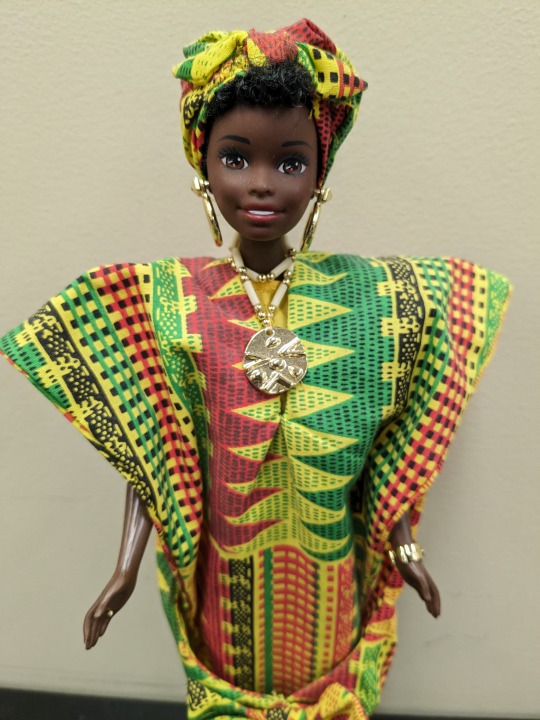
This Barbie is a collector's edition doll that is part of the Dolls of the World collection from 1996. The official description reads:
Tour the wilds of Africa with this Collector Edition Barbie doll in a traditional costume from the West African country of Ghana. She wears an authentically styled Kente cloth tunic dress that ties into a bow below her knees. A brightly colored turban ties around her head and she wears flat golden sandals for walking through the lush forests. Her beautiful jewelry, including golden hoop earrings, a bangle bracelet and a seashell necklace, all add to the captivating charm of this African beauty.
Check out our other Barbies at #bpcl barbies.
The Browne Popular Culture Library (BPCL), founded in 1969, is the most comprehensive archive of its kind in the United States. Our focus and mission is to acquire and preserve research materials on American Popular Culture (post 1876) for curricular and research use. Visit our website at https://www.bgsu.edu/library/pcl.html.
43 notes
·
View notes
Text
Mistress of Waters: Oshun
Throughout history, water has been used as a symbol of wisdom, power, grace, music, and sensitivity.
Across many ancient civilizations, love was placed under the domain of a particular deity, usually, but not in all cases, a goddess.

In the Classical world, for instance, there were Venus and Aphrodite, love goddesses of the Roman and Greek pantheons, respectively.
In West Africa, the Yoruba people believe in a love goddess named Oshun.
They inhabit the southwestern part of modern-day Nigeria and the southern part of Benin.
Although #Oshun is regarded principally as a goddess of love, there are other aspects to this Orisha.
Oshun is the goddess of love, sensuality, and water and the protective deity of the river Oshun. She is also associated with fertility, lushness, greenness, and life.
Alongside this river is a sacred grove, probably the last in Yoruba Culture, dedicated to Oshun.
When she came down to earth, she wore a gold dress and jewelry. This is why her worshippers also wear gold and yellow attires to honor her.
According to the tales, the gods came down, they completely disregarded Oshun while they engaged in creating the earth.
She returned to the heavens, where she spent time admiring herself in the mirror. Oshun often carries a mirror so that she can admire her beauty.
In the absence of Oshun, the other gods faced difficulties. They could not populate and revive the earth.
They went back to heaven to apologize and beg her. When she came back to the earth, she revived it with water.
Although Oshun governs love and sweet waters, she is also a benevolent deity.
She is said to be the protector of the poor and the mother of all orphans. It is Oshun who fulfills their needs in this life.
Oshun is commonly shown as a beautiful, charming, sensual, and coquettish young woman.
During the slave trade, Oshun was brought to the Americas and adopted into the pantheons, branching out of the traditional African belief system.
#oshungoddess#oshun#oshunenergy#vodou#illustration#artists on tumblr#haiti#africa#astrology#voodoo#waters#african spirituality#african beliefs#esoteric#ancestral work#ancestors#magick#conjure#illustrator#ogoun#oya#iya#shango#damballah#dahomey#guinen
126 notes
·
View notes
Text
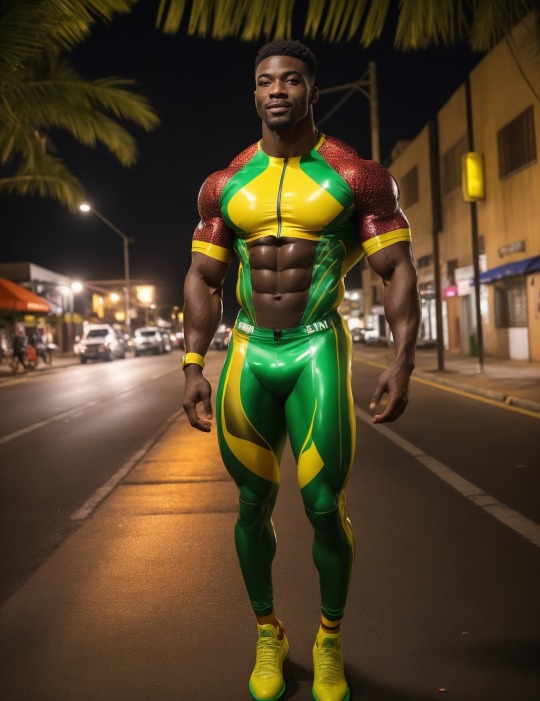
🌐 Radiating West African Vibes: Meet Bubune from Ghana! 🇬🇭
👬 Immerse yourself in the rhythm of #OBEYseason16, where muscular men proudly wear rubber suits inspired by their nations' flags. This season's challenge took them to their capital cities for a pose-off that radiates West African vibes and masculine charisma. Get ready to witness the fusion of national pride and style like never before! 🌍💪👢
🗳️ How to Vote: Boost Bubune's journey by engaging with our content on Instagram, Tumblr, and X. Your Yes votes in our Instagram stories can give him the push he needs, with No votes being subtracted. Your voice matters, so let's make Bubune's West African vibes known!
🕶️ Meet Bubune from Ghana: 🇬🇭 Bubune, representing the heartbeat of Ghana, wears the vibrant colors of the national flag. Against the backdrop of the capital city, he strikes a pose that blends cultural charm with raw masculine energy. Will Bubune's journey in #OBEYseason16 be a triumph? It's in your hands!
#OBEYseason16 #AIgenerated #Rubber #Latex #AI #Ghana 🇬🇭
15 notes
·
View notes
Note
Is there some African, or more specifically Nigerian example of a Mermaid type creature?
The European mermaid seems to be pretty much very alike across most of Europe, with some variations in detail. I also know China has the Jiaoren, which is also seems to follow the same appearance as the European to some degree. ?
So, primarily, there would be the Mami Wata
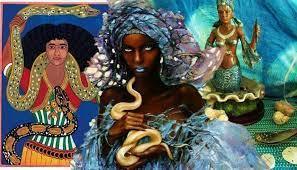
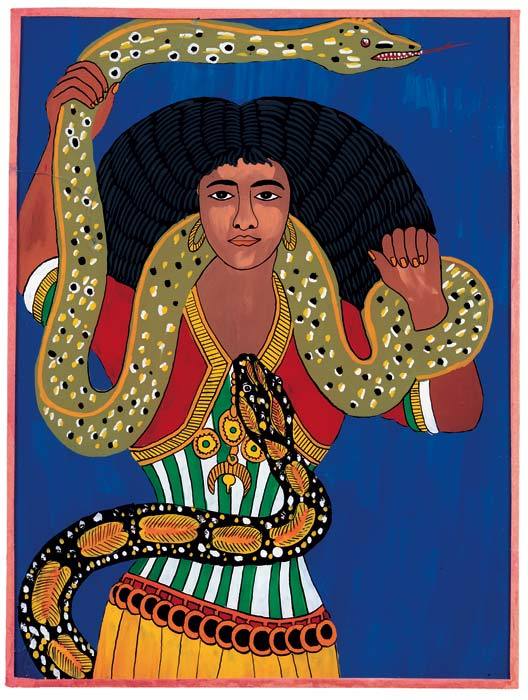
Though, it should be mentioned that all across West, Central, and Southern Africa, and for Voodoo practitioners and African wiccans, the Mami Wata has multiple interpretations.
Some interpret that there's only one Mami Wata, a deity who has power over water and the ocean, some interpret Mami Wata as a species of creatures akin to conventional mermaids, and others still interpret the Mami Wata as the manifestation of those who lost their lives during the Trans-Atlantic Slave Trade (specifically on the slave ships).
However, there are three universal aspects to the Mami Wata that are pretty much set in stone:
She is half-humanoid/half-fish (so, again, the comparisons to conventional mermaids)
She has long, flowing hair
She is able to charm snakes (hence why most depictions of Mami Wata have a snake either hanging from her or coiled around her neck)
Though, shout-out to the Nollywood film that my mother was watching last year where the core conflict was about a guy who made a demonic deal with a group of witches for his soul. While trying to avoid paying up, he hooked up with a woman who turned out to be a Mami Wata, and the climax of the movie is the Mami Wata girl deciding that she doesn't want to give up her new boytoy, so she summons her Mami Wata friends for a showdown with the witches...
And it just looks like a regular World Star catfight. I mean, they didn't even give the actresses who were supposed to be Mami Wata makeup or blue dresses, and the only effect they had was some soft rain.
35 notes
·
View notes
Text
ᖴᒪOᗯEᖇᔕ Iᑎ ᗷᒪOOᗰ - ᐯᗩᒪEᑎTIᑎEᔕ ᗪᖇᗩᗷᗷᒪEᔕ





Day 10 - Gift Exchange
- Pink Elephant - Sheva Alomar - Resident Evil 5
- In which Sheva receives a gift from a comrade during the BSAA's office event, however, it is unsigned.
- Check out more prompts and other activities on the Flowers In Bloom Event Masterlist!

The sound of phones ringing, keyboards clicking and mundane talk was customary within the office sector of the BSAA West African Branch. The stench of coffee was ever present in the air, but even that wasn’t enough to stir Sheva’s frustrated, though curious, gaze at the item that rested on her desk. Her eyebrows had been furrowed deep on her forehead since she’d gotten the little charm bracelet earlier in the day. It still rested in it’s gift box, shining in the piss-poor fluorescent lighting from the office ceiling. She unconsciously tapped the pen in her hand on her lips in thought, racking through her brain on who could have been the bestower to this gift.
She should be focusing on her paperwork; the case she had just finished up with Chris Redfield had stacked up a mountain of reports she needed to sign off and send out to be filed. Yet every time she turns to try and focus on it, the mystery behind the piece of jewelry always brings her attention away from it.
Sheva’s semi-given up on the paperwork at this point, tossing her pen onto the desk and instead replacing it by picking up the bracelet in her hands to examine it. Thin pieces of brown and tan string are woven and tied together, with pieces of each end left out to make slipping it on and off easy, as well as for adjusting the tightness of it on the wearer's wrist. Wooden and crystal beads decorate the band and in the middle is a metal platelet with an engraving of a double-headed battle axe. It didn’t take her long to determine the symbolism of the axe to be representative of the God of protection, Shango, from Yoruba beliefs.
The thought and care put into the gift did wonders in making Sheva smile in the moment upon being called to receive her gift from the table, but now, she’s eager to know who had been behind it. There were a handful of possibilities that came to her mind, but most of them she had already crossed off her list as she watched her comrades interact, some having revealed to their partners that it was they who had gifted them their gift, others already knowing who their benefactors were. She was running out of options, and quite frankly, it was making her go a little crazy.
There was one candidate, however, that she still thought plausible. Though just the mere thought of them put her on edge.
Her eyes shift past the bracelet in her hand and to the desk two spaces away from her own, falling upon you, the fairly new recruit that had been bumped up to the Beta task force within the first six months of your arrival. You had skill, guts, and a mouth more rancid than any undead she’d faced, and she hated the fact that you could grab her attention so easily.
Could this be simple admiration, or could this be the beginnings of a crush? Sheva couldn’t tell the difference between the two, but what she could tell was that the desire to impress you, to get to know you, was prevalent in her chest whenever the two of you crossed paths. Quite frankly, if it was you that had gifted her the bracelet, it would be a great talking point for her to approach you with. Then again, the thought of it being the opposite posed a distasteful feeling in her throat.
A sigh leaves her lips as she watches on. A part of her hoped that you were the gifter of this piece of jewelry, but after much internal deliberation, Sheva tucked the bracelet in her desk and forced herself to attend to her reports once more. With the amount of people trickling out of the office now, and knowing that you make it a point to be one of the last late stragglers leaving, she’ll be able to confront you soon enough.

#flowersinbloom🏵#black reader#black tumblr#resident evil#resident evil 5#sheva alomar#resident evil sheva#sheva alomar x reader#sheva alomar x black!reader
7 notes
·
View notes
Text
12 famous African goddesses and gods with mind-blowing history - Briefly.co.za
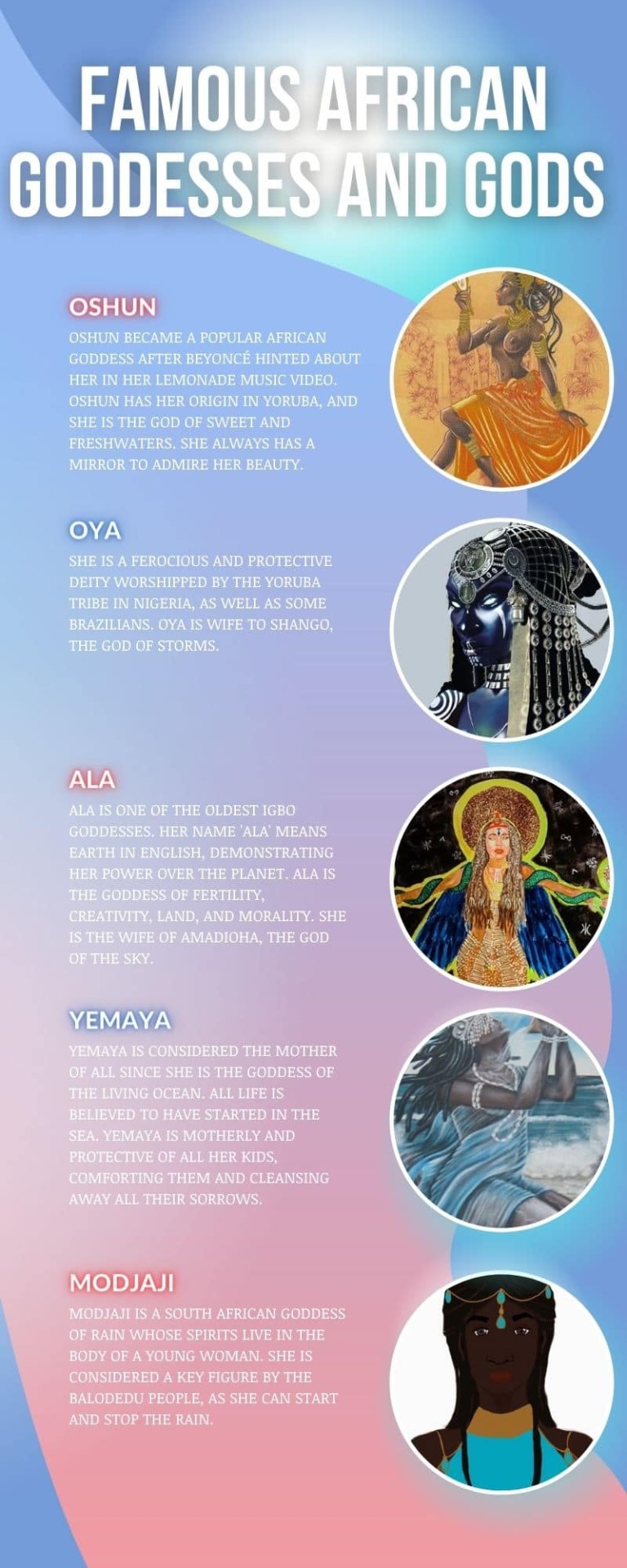
Most African cultures believe that God used to live amongst them in the past before He left for His Kingdom in Heaven after several human transgressions. In His place, He appointed lesser African gods and goddesses to perform certain functions. As such, Africans have the god of water, rains, winds, earth, and fire, among others, whom they can pray to directly, and they will intercede on God's behalf.
READ ALSO: Sotho culture, traditions, food, traditional attire, dance, values, and facts
12 African mythology gods and goddesses
Ever looked at African gods and goddesses pictures? These beings are considered powerful in different areas and in most cases. Their images reflect what they are associated with. Below we shall examine some of the famous African goddesses and gods with pictures and their meanings in their respective communities.
1. Oshun

Who is Oshun African goddess? Oshun became a popular African goddess after Beyoncé hinted about her in her Lemonade music video. Oshun has her origin in Yoruba, and she is the god of sweet and freshwaters. She always has a mirror to admire her beauty.
Oshun is revered by many for her abilities to heal the sick, foster prosperity, and bring fertility. The image of this goddess is represented by a stunning, charming, and coquettish young lady. Oshun means sweetness, joy, beauty, and good cheer.
2. Oya
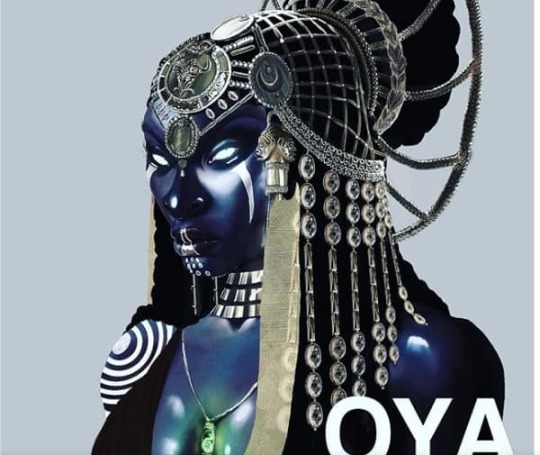
We cannot list African goddess names without including Oya. She is a ferocious and protective deity worshipped by the Yoruba tribe in Nigeria, as well as some Brazilians. Oya is wife to Shango, the god of storms. Oya is the goddess of wind, thunderbolt, and fire; she has the power to transform gentle breezes to raging hurricanes or cyclones. It is believed that she accompanies her husband during his thunderstorms to destroy buildings, blow things up, and rip off trees.
Due to her prowess, Oya brings down dead wood to give room for new. Additionally, she is the guardian of the gates of death, as she helps the dead in their transition from life.
3. Ala

Ala is one of the oldest Igbo goddesses. Her name 'Ala' means earth in English, demonstrating her power over the planet. Ala is the goddess of fertility, creativity, land, and morality. She is the wife of Amadioha, the god of the sky. This goddess is honored and celebrated during the yearly yam festival.
When angered, Ala will convince her husband to deny rain to the people and can also cause other natural disasters.
4. Yemaya
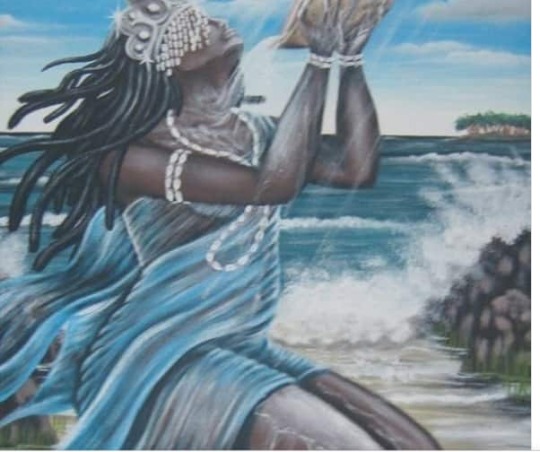
Yemaya is considered the mother of all since she is the goddess of the Living Ocean. All life is believed to have started in the sea. Yemaya is motherly and protective of all her kids, comforting them and cleansing away all their sorrows. It is thought she can cure infertility in women, and the cowrie shells symbolize her wealth.
Yemaya is not easily angered, but when she does, she is destructive and intense just as the sea during a storm.
5. Modjaji
Modjaji is a South African goddess of rain whose spirits live in the body of a young woman. She is considered a key figure by the Balodedu people, as she can start and stop the rain. The rain queen has been around for the longest time, and it was only in the 16th century that her spirit decided to dwell in a woman.
READ ALSO: Popular traditional black South African recipes and South African food
6. Nana Buluku
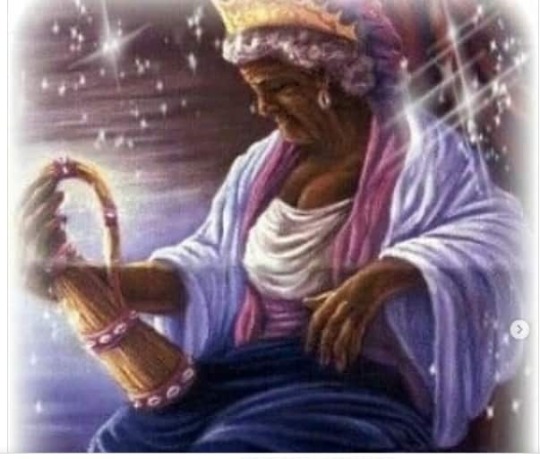
Nana Buluku is a prominent deity famous in most West African nations. She also has different names in various tribes. Nana Buluku is worshipped as the mother goddess. Her image is that of an older woman who is thought to be the creator of the world.
7. Abena
Known as the river goddess, Abena shields children and looks after them as adults as she perceives her believers as her children. Her name is associated with gold, brass, as well as with other wealth symbols.
8. Oduda
Oduda is among the African goddess names and meanings venerated by the North-West African community in Benin, Yoruba, and Dahomey. Her name Oduda means 'the black one,' and her appearance is that of a serpent. Oduda is the deity behind sacred prostitution that is practiced in the Caribbean Islands.
9. Inkosazana
Inkosazan, which means 'lady heaven,' is a prominent and adored goddess of the Zulu community in South Africa. She is thought to be responsible for corn, one of the vital dietary supplements in the Zulu tribe.
10. Age-Fon
Other than the African goddesses, there are gods that cannot go unmentioned in this piece. Age–Fon is a god in Benin, whose power and fame goes as far back to the Dahomey Empire. He is the son of the creator goddess Mawu-Lisa. Age can protect and lead hunters in their hunting expeditions, whether at night or during the day. Besides, he also guides and safeguards his tribesmen in times of battles and wars. It is alleged that Age replenishes his energy and power from his mother. His image is that of a young lad wearing hunter's clothing. To honor Age-Fon, hunters sacrifice to him fleshy parts of the animals they hunt.
11. Kibuka
Kibuka is the god of war in the Buganda Empire kingdom. It is believed that Kibuka has been with Buganda's since the 9th century, even before the arrival of the Europeans in the country.
After The Bugandan military encountered many defeats, its king met with the Creator, Mukasa, to seek help to defeat his enemies. It is here that Mukasa gave them his younger brother Kibuka to be their god of war. Before embarking on any battle, the army would sing, dance, and offer sacrifices to Kibuka. Kibuka would then go ahead of the warriors to clear their paths and ensure their victory.
12. Adroa
Adroa is a fascinating African god of death for the Lugbara community in Uganda and Congo. He has two characteristics of good and evil. Due to his duality, Adroa's body is divided into two. One of the parts is short and black, symbolizing evil, while the other is tall and white, signifying goodness. Adroa will manifest himself to people in any form that fits the situation at hand. It is also believed that this god appears to individuals before they die.
#African Gods and Goddesses#African Religious Principals#12 famous African goddesses and gods with mind-blowing history
102 notes
·
View notes
Text
I have an urge to....
I have an urge to make a Barbie princess charmed school (without the barbie magic) House of the dragon with Aemond , Jace, Luke Baela and Rhaena fanfic where there are other kingdoms all over the world, and for peace diplomacy the heirs of many houses go to the same school in one specific kingdom. And maybe to heal the kids relationship after two years after the accident.
Just wholesome gangasta kids (because how they were all unhinged in that episode), healing, fluff, birth of long frienship and writer having the power to change literally anything because is a fanfiction
And I would like to put as many cultures but now I don’t have a lot of other ethnic names and surnames (male female), from south east asian, east asian, middle eat, balkan, West, East and Northern European, Arab, African (From North to South, East and West) Polyneasian, Latin America, Caribbean anything I will try to make some research from clothing, religion language and advice is always accepted.
#aemond targaryen x reader#Aemond Targaryen#house of the dragon#games of thrones#lucerys velaryon#jacaerys velaryon#house tyrell#house baratheon#baela targaryen#rhaena velaryon#aemond targaryen x black reader#black reader#Oc#original character#black!fem!reader#daemon targeryan#rhaenyra targaryen#rhaenys velaryon#corlys valeryon#viserys i targaryen#alicent hightower#otto hightower
72 notes
·
View notes
Text
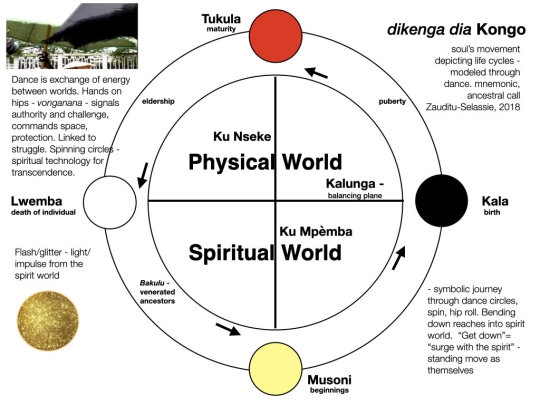
Archeologists also found the Kongo cosmogram on several plantations in the American South; they were Richmond Hill Plantation in Georgia, Frogmore Plantation in South Carolina, a plantation in Texas, and Magnolia Plantation in Louisiana. Historians call the locations where crossroad symbols were possibly found inside slave cabins and African-American living quarters as 'Crossroads Deposits.' Crossroads deposits were found underneath floor boards and in the northeast sections of cabins to conjure ancestral spirits for protection. Sacrificed animals and other charms were found where the crossroads symbols were drawn by enslaved African-Americans and four holes drilled into charms to symbolize the Bakongo cosmogram. Other West-Central African traditions found on plantations by historians is the use of six pointed stars as spiritual symbols. A six pointed star is a symbol in West Africa and in African-American spirituality.
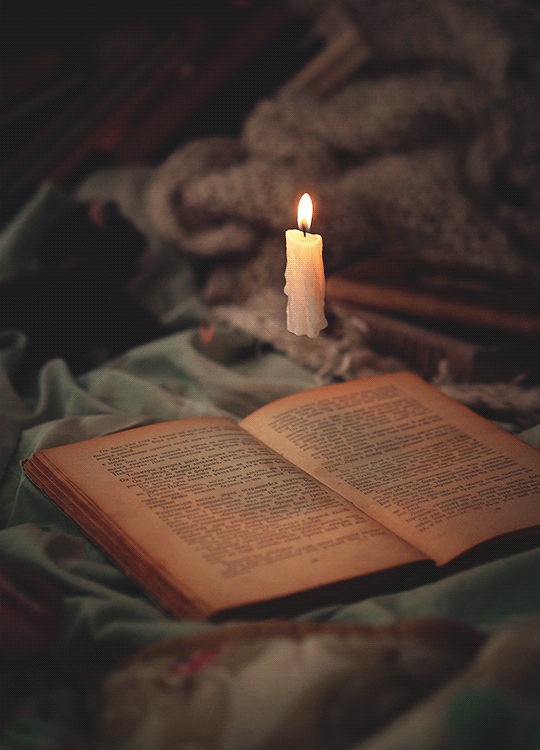
On another plantation in Maryland archeologists unearthed artifacts that showed a blend of Central African and Christian spiritual practices among slaves. This was Ezekiel's Wheel in the bible that blended with the Central African Kongo cosmogram. This may explain the connection enslaved African Americans had with the Christian cross as it resembled their African symbol. The cosmogram represents the universe and how human souls travel in the spiritual realm after death entering into the ancestral realm and reincarnating back into the family. The artifacts uncovered at the James Brice House were Kongo cosmogram engravings drawn as crossroads (an X) inside the house. This was done to ward a place from a harsh slaveholder. Also, the Kongo cosmogram is evident in Hoodoo practice among African Americans. Archeologists unearthed on a former slave plantation in South Carolina clay bowls made by enslaved Africans that had the Kongo cosmogram engraved onto the clay bowls. These clay bowls were used by African Americans for ritual purposes.

The Ring shout in Hoodoo has its origins from the Kongo region from the Kongo cosmogram (Yowa Cross) and ring shouters dance in a counterclockwise direction that follows the pattern of the rising of the sun in the east and the setting of the sun in the west. The ring shout follows the cyclical nature of life represented in the Kongo cosmogram of birth, life, death, and rebirth. Through counterclockwise circle dancing, ring shouters built up spiritual energy that resulted in the communication with ancestral spirits, and led to spirit possession by the Holy Spirit or ancestral spirits.
Enslaved African Americans performed the counterclockwise circle dance until someone was pulled into the center of the ring by the spiritual vortex at the center. The spiritual vortex at the center of the ring shout was a sacred spiritual realm. The center of the ring shout is where the ancestors and the Holy Spirit reside at the center. The ring shout tradition continues in Georgia with the McIntosh County Shouters. At Cathead Creek in Georgia, archeologists found artifacts made by enslaved African Americans that linked to spiritual practices in West-Central Africa. Enslaved African Americans and their descendants after emancipation house spirits inside reflective materials and used reflective materials to transport the recently deceased to the spiritual realm. Broken glass on tombs reflects the other world. It is believed reflective materials are portals to the spirit world.
#bakongo#kongo#congo#cathead creek#mcintosh county#african american#west central africa#spiritual vortex#cross#cosomogram#yowa cross#cosmogram#african#afrakan#kemetic dreams#brownskin#africans#afrakans#african culture#afrakan spirituality#Ezekiel's Wheel#Magnolia Plantation
48 notes
·
View notes
Text
@theniceandaccuratebookshelf i didn't have a better way to share this it wouldn't let me paste it into dms so here ya go
u cant point out any mistakes because it's already submitted
Throughout history, mythology has been shared in different ways, from written work to stories passed down orally, to songs. Many songs tell stories and contain symbolism just like mythology; they are an essential part of ancient and modern cultures. Neil Gaiman makes heavy use of mythology to develop and contextualize the characters in his novel Anansi Boys. Alongside the classic West African mythology used in this novel, Gaiman also uses music to develop and characterize the main characters in this story.
Anansi’s character is developed by his interactions with music and the songs he sings in the book. One of the first things the reader learns about Anansi is how he died- in the middle of singing “I Am What I Am” at a bar for karaoke. The song choice shows how confident and spirited the character Anansi is. Gaiman portrays Anansi as an extremely over-the-top character in several ways, but one way that he repeatedly conveys this message is through associations with music. Anansi is the epitome of a wild and free surface, and when describing the night that he died, Gaiman also describes the way that he captivated the audience with his singing the first time he sang that night as being “in a manner that would have caused Tom Jones to be festooned in flung feminine undergarments, and which brought Fat Charlie’s father a complimentary beer, courtesy of the several blonde tourists from Michigan who thought he was just about the cutest thing they’d ever seen.” (27) Anansi captivated his audience, and in the description of his singing, a characterization of his personality also becomes visible. Anansi’s singing serves as more than just a funny and embarrassing moment in the story, it also uses known media in the form of music to share insight into who he is as a character, in the same way that the excerpts of West African myths that are inserted into the story do. In addition to his night of singing, Anansi appears in the hospital while Charlie’s mother is on her deathbed, along with a jazz band, causing a commotion in the halls while playing her favorite song, “Yellow Bird”. Though Charlie was wildly embarrassed by these actions, his mother told him that Anansi’s actions “did [her] a power of good last night” (20). Anansi’s over-the-top nature is shown through references to music that serve to portray his character the same way the references to West African mythology do, showing his wild side in the same way that the stories show his tricky side.
Spider is introduced as a perfectly suave character, much like Anansi, and everything Fat Charlie would love to be. One of the first things Spider does in the book is singing karaoke out at a bar with Charlie and Daisy, just like how Anansi died, singing his heart out at karaoke. His smooth demeanor and over-the-top personality are a lot like his father, and his interactions with music show those parallels. “Spider began to sing. It was “Under the Boardwalk.” It wouldn’t have happened if Fat Charlie had not liked the song so much. When Fat Charlie was thirteen he had believed that “Under the Boardwalk” was the greatest song in the world … And now Spider was singing his song, and singing it well. He sang it in tune, he sang it as if he meant it.” (83) On top of the parallels to Anansi singing karaoke and the way that they both charm the crowd, Spider’s song choice also has another significance. Picking this song that Charlie had loved as a child adds to the tension between the two characters, but it also foreshadows the development that the two were the same person back when they were young. By picking this song and having Spider sing karaoke, Gaiman cements him as a character with a lot in common with Anansi, and as a rival to Charlie. Spider is also portrayed as incredibly charismatic, and this is shown through his interactions with music as well. “When people stood near Spider on a day that he was this happy, their worlds would seem a little brighter. If he hummed a song, other people around him would start humming, in key, like something from a musical.” (195) Spider’s ability to brighten others’ days with a song is another parallel to Anansi’s personality and the way he brightened Charlie’s mother’s day when he brought the jazz band to the hospital. Throughout the story, Gaiman uses music and song thoughtfully to create parallels between the two characters that show similarities in their personalities.
Charlie is initially characterized in a very different way from Spider and Anansi, as disliking music and being embarrassed by it. Gaiman uses Charlie’s relationship with music as a parallel for his relationship and similarities to his father. Charlie is embarrassed by his father’s appearance in the hospital with a jazz band at the beginning of the novel, and when he goes to the bar with Spider he is too anxious to sing. Though he initially decided that he was going to sing, he got overwhelmed and was unable to go through with it. “His mouth was dry. His heart was fluttering in his chest. On the screen was his first word: Unforgettable…” (83) Charlie’s relationship with music to this point is filled with anxiety and embarrassment. Gaiman uses this to show how Charlie starts as a very generic, boring type of person, a huge contrast to his brother and father. Throughout the story, Charlie’s relationship with his family changes, and as he sees how Spider lives he becomes less embarrassed by his father. By the end of the novel, his relationship with music has completely changed, and when he begins to sing in front of a crowd he doesn’t freeze up, he captivates the audience the way the rest of his family had when they sang; “As he entered the last chorus, he began to clap his hands above his head, and soon the whole room was clapping along with him, diners and waiters and chefs.” (308) Charlie has become much more confident, and embraced the parts of himself that are like Anansi by the end of the novel. In addition to this, the song that he sings is “Under the Boardwalk”, his favorite song from when he was a kid. Through this moment he reclaims those parts of himself and in a way proves wrong the things that Spider made him feel about himself by choosing to sing his song, and captivating the room while doing it. At the end of the novel, Gaiman shows that Charlie has fully come full circle both in his relationship with music and with his family; “Charlie’s a singer these days. He’s lost a lot of the softness. He’s a lean man now, with a trademark fedora hat. He has lots of different fedoras, in different colors; his favorite one is green.” (365) In addition to becoming a singer, Charlie has also adopted his father’s signature fedoras. Gaiman uses music throughout the story to show how Charlie’s character develops and changes as he embraces his family and becomes more like his father. Gaiman uses music throughout the novel Anansi Boys to develop the main characters and draw parallels between them. Charlie’s journey from being embarrassed by his father to emulating him is shown by his relationship with music and his ability to get over his fears and sing. The parallels between Spider, Anansi, and later in the novel Charlie are also shown by the similarities in the music they enjoy and the way the crowds react to them. Gaiman’s use of music throughout the story as a form of mythology that is commonly referenced allows him to share details about the characters and how they develop throughout the novel.
9 notes
·
View notes